#she remembers her iowa past and goes off
Text
I think if the wings play the fever they probably shouldn’t keep putting Sheldon on Clark if they want to stop her
#she remembers her iowa past and goes off#anyways the aces coming into the playoffs winning is kind of making me side-eye#if we get a threepeat… 😐#can like the sun win or something they’ve never had a championship#the mystics starting 0-12 and then making the playoffs is a cool story#but also shows we are bad at tanking#i forgot what the conditions of the wings trade were… do we get their first rounder or#oh it’s Atlanta’s first round pick#sure i guess#wnba#dallas wings#indiana fever
4 notes
·
View notes
Text
Review: Unbelievable

Synopsis:
Four pretty little liars’ charmed lives have turned into living nightmares. Emily’s been shipped off to Iowa to live with her überconservative cousins. Aria’s boyfriend is behind bars—because of her. Spencer’s afraid she was involved in Ali’s murder. But Hanna’s fate is far worse: She’s clinging to life in the hospital because she knew too much. These liars have tried to keep their scandals secret, but the truth is about to rock their pretty little world!
Plot:
The only way to stop someone as fabulous as Hanna is to hit her with a truck, or SUV in this case. With Hanna waking up from her coma, not remembering anything from that night, Aria, Emily, and Spencer are back to square one, trying to figure out who A is and finding Ali's killer. Not that Emily can help, giving her family homophobia. She gets sent to Iowa, only to realize that there will always be girls that catch her eye no matter where she goes. Spencer, dealing with the Golden Orchid business (still), her and Melissa's relationship is hitting the rocks, and her parents are determined to fix it. Forcing the sisters to work together, Melissa reveals Ian's inability to lie to her. She knew Ali and Ian were a thing back when Ali was alive and that she "took care of it" in her own way. Where Spencer, even her fuzzy block-out memory, knew she could not kill Ali, but could her sister? Melissa always got her way, and even Spencer did not see the length to which Melissa would achieve that, so murder could be within the limit. Then there is Aria, with significant family issues to deal with, past guilt she wants to get off her chest, and a new art class where she can start to focus on putting her life back in order. With the big event of this novel being Hanna's "welcome back to Rosewood" celebration, one that Mona and Spencer planned for Mona's BFFFFFF, a lot of drama is about to go down, including the revealing A.
Thoughts:
Sara Shepard really threw this novel to the wind, as it is the most drama-filled and plot-moving story yet in the series. The story is literally giving my rating one more heart than it deserves, just because of the amount of information given out compared to the previous books in the series. That information being: who A is, and who killed Ali, as it is accompanied by an arrest. Shepard kept the same format as the other books, as it is working well. The story has minor drama, the main event with big drama, and the aftermath setting up the next installment. This book does that, but the little drama is very minor, and the big drama is a game-changer. The little drama is all very reversible issues centering around the girls not wanting to make any life-changing decisions. An example is Emily going to Iowa at the beginning of the novel but being back in Rosewood for a few chapters. Thus, readers are forced to read through these small minded items in order to get to the big drama at Hanna’s party. The favorite character in this novel and Shepard is making it easier to like these girls would be Aria. Our girl is trying her hardest to fix past mistakes, and now that she is living with Meredith, so she cannot really be on a witch hunt 24/7 with her. Almost accepting that her family as she knew it was gone, Aria started trying to make amends with people and was not looking for a new guy now that Ezra was gone (and hopefully stays gone. YUCK!). Shepards writing is getting better, as she starts to make more emotional connections between the characters, ones that you can relate to; however, everything gets left to the last minute because Shepard never has our girls together, forcing them to see each other at these significant events, do a massive talk about what they all individually learned (which always happen to be the same things), and then to rush off to save one of them / hunt A / catch Ali's killer. Thus, making A's dramatic reveal in this novel kind of rushed, and one Shepherd could have drawn out a lot more. With this being the end of phase one for the girls, their story is not done yet, as the trial for Ali's killer is here, and Rosewood has to bury another one of their own.
A Suspects:
The concept of the novel is our four girls trying to find out who A is, thus I thought it would be fun to keep a suspect list to see how many people Shepard writes for the girls to at one point suspect and by whom. So here is the list for book #4:
Maya by Emily
Mona by Hanna
Read more reviews: Goodreads
Buy the book: Amazon
0 notes
Text
you’re name, forever the name on my lips
ts x jolex week 21
day 2: last kiss- speak now
wc: 919
pairing: Jo Wilson/Alex Karev
summary: she never did think that they'd have a last kiss. but they did
rating: gen.
category: angst.
warnings" angst. no happy ending
AN: this is technically in before midnight where im from haha. go me! also, we’re going to ignore the fact that all of this was written today…
____
It had been long and beautiful, she remembers that much.
Standing in the gate twenty-three’s terminal, she stood in an oversized sweatshirt that normally clung to Alex’s frame, but hung loosely on hers, and a pair of old, ripped skinny jeans that she’d had longer than she or anyone else could deem rational.
Her hair was up and out of her face, tied into a loose ponytail on the top of her head. Her eyes had bags underneath them from working a twenty-four hour shift, but instead of going home to the warm and cozy sheets of their bed, she had insisted that she see him off before his flight.
When they hear his group being called, she pulls away from her place in his arms, blinking sleep out of her eyes and looking up at him dreamily, the exhaustion from the day hitting her full force. “You gotta go,” she whispers softly, and he brushes a strand of hair away from her face.
“You need to go to sleep,” he chuckles, amused with how tired she looks under the bright fluorescent lights of the airport. When she gazes back up and him and gives him a sleepy smile, he can’t help but be thankful that’s she’s too tired to see that his heart is breaking inside his chest at the fact that he’s lying to her while she looks at him like this,—lying to her because in reality his flight leaves in another hour, and he wasn’t going to visit his mom in Iowa, he was getting on a plane to see his ex-wife and two kids in Kansas.
She sighs, reaching on her toes and wrapping her arms around his neck, humming into his chest. “I know. Give your mom my best for me.”
He swallows the words on the tip of his tongue, threatening to spill over and tell her the truth. But he holds them back, because they would cause her pain, and that’s the absolute last thing he wants to do.
She nuzzles into him, feeling an overwhelming sense of safety and security, taking in the scent that she had gotten to know all too well the past seven years, a scent she can only describe as purely ‘Alex’. She places a peck on his lips, leaving some of her chapstick on the corner of his mouth, but he doesn’t seem to mind, as he leans in for another one; short and sweet, just like the one before it.
“I love you,” she murmurs to his lips, leaning her forehead against his.
He feels a deep pain hit him, and he knows it’s the guilt eating at him. He wants to tell her, more than anything. But it was too much; too much for him to handle, and it would certainly be too much for her as well. She was fragile —and as much as he hated that word and would always be the last thing he would use to describe his wife— at this moment in time, it was true. A revelation like this could send her in a downward spiral, and he didn’t want to ever see her so broken again. Even if she could take it, he couldn’t. He couldn’t bear to see the woman he loved more than anything struggle to get out of bed every morning, and he was scared news like this would cause her to do just that.
“I love you too Jo, so much,” when his lips meet hers that time, it’s filled with love and adoration, passion and heartache —all the things he wished he could say he communicated through his lips. He just hopes that she understands it all.
They don’t pull away completely, their lips still barely brushing up against one another, but enough to feel the fire that coursed through their veins, “I love you Alex,” she says into his lips, one more time for good measure. They eventually break their hold, and before they know it, he’s waving goodbye tp her as he prepares to ‘board the plane’, and she’s turning away, off to find the nearest coffee shop to wake her up before the drive home.
On the floor of their loft, she sat in an old sweatshirt of his, faded and worn from years of use, but his scent still permanently etched in the seams. She lifts the fabric up to her nose, breathing in the scent of him that had left everywhere in her home except for there.
She catches a glance on the photo perched on her bedside table —one from their wedding, the same one he’d always thought he kept secretly tucked in the back of his wallet.
All she hoped was that in Kansas, the sun shined, and it was a beautiful day. And when he pulled out his wallet, looking for a dollar to give the kids for ice cream, he finds their picture, and it makes him wish he had stayed. Because she had planned for a lot of things in life, but never once had she planned on him changing her mind.
She crawls into the covers of her bed, casting a glance at the clock. 1:58. And she closes her eyes, and goes to sleep.
She’s thankful that she doesn’t pull out her phone to check the time once her and Alex were apart, otherwise she would’ve seen that it was 1:58 am. The time of their last kiss, with his name forever the name on her lips.
____
@thejolexgroupchat
#jolex#alex karev#jolex fanfiction#jo wilson#jolex fanfic#tsjolexweek21#jolex fic#jo wilson-karev#jo karev#grey's anatomy#grey's anatomy fanfic#grey's anatomy fic#grey's anatomy fanfiction#taylor swift#last kiss#jo x alex#alex x jo#camilla luddington#justin chambers#grey's abc#greys abc#payton writes#angst#no happy ending
24 notes
·
View notes
Text
Western August I: Stagecoach (1939) - Recap and Review
Let’s start at the beginning...almost,
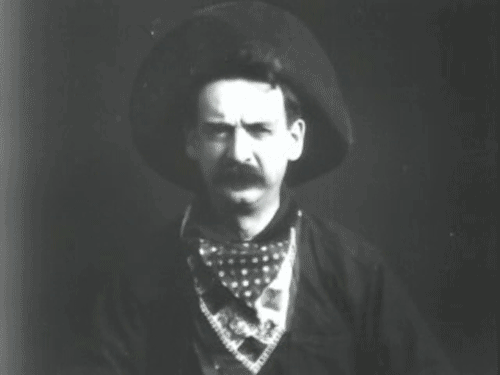
The Western arguably was born with the 1903 film, The Great Train Robbery. This 12-minute short film is a classic, and one of the earliest achievements in film-making. It’s also, unsurprisingly, a Western, and based on an actual train robbery. At the time it was made, the Wild West had only really ended a few years prior, with its heyday being about 40 years past. Which, yeah, is CRAZY. People who remembered the Wild West lived into the 1950s and ‘60s. It seems like so long ago, and it was, but it was still relatively recent from a historical standpoint.
From then, the Western remained a staple of cinema, and would be so for over half a century. And then, enter John Ford. Born in 1894, the Irish American director began his career in 1914 as an assistant and handyman, often working with his older brother Francis. Eventually, John took his place as a director, starting with silent films, especially westerns. Starting with the very successful film The Iron Horse in 1924, he quickly rose to stardom. He transitioned from silent films to talkies pretty effortlessly, and continued his streak. All the while, he was also one of the first directors to have a roster of actors in his company. You know how Tim Burton always uses Johnny Depp and Helena Bonham Carter? Or how the Coen Brothers always use Frances McDormand and John Goodman? Or Wes Andersen with Bill Murray and Owen Wilson? Yeah, that started with John Ford and...ugh...
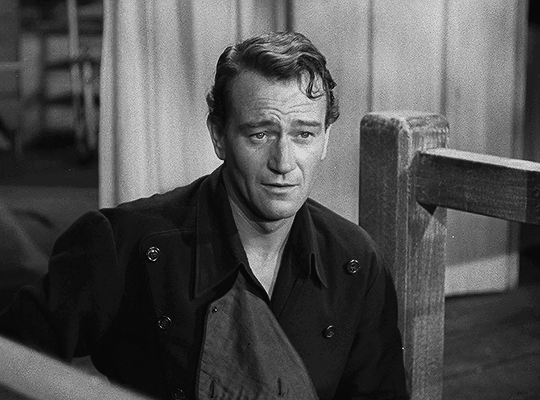
Before I start...fuck John Wayne.
Dude was a racist homophobic asshole, and absolutely a dick. Look it up, or don’t if you’d rather not have one of cinemas most iconic faces completely ruined for you. But OK, outside of that one time that he said that the Native Americans were “selfishly trying to keep the land for themselves”, or that he believed in white supremacy over uneducated blacks...yeah, he’s a DICK...
Marion Robert Morrison was born in Iowa in 1907, and began his film career after becoming injured while surfing without a surfboard and ending his football career. Yes, really. His football coach was a friend of a film director named John Ford, who hired Morrison as a favor to him. Said football coach was also friends with an actual remnant of the Old West: WYATT FUCKING EARP. YEAH.
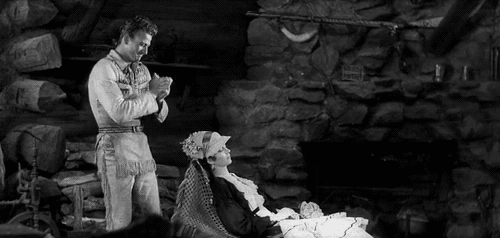
For years, Morrison was a bit player until starring in the film The Big Trail in 1930, a Western directed by Raoul Walsh. And he wasn’t exactly famous after this, but it was with this film that he took up a screen name: John Wayne, after a Revolutionary War general, Anthony Wayne, and...well, the name John. Anthony sounded too Italian. Yes, really. After this movie, Wayne continued to star in more Westerns, and even became one of the first film cowboys to sing on camera.
And then, 1939 came along, and John Ford came to him with a new film project. Being a classic Western, the film was about a group of settlers riding on a stagecoach together through the West. Strangers to each other, they find themselves attacked by a group of Native Americans belonging to the Apache tribes. This film, an adaptation of a 1939 short story, would come to be known as Stagecoach. And it would launch Ford, Wayne, and the Western genre into a Golden Age. So no more navel-gazing, let’s get started!
SPOILERS AHEAD!!!
Recap
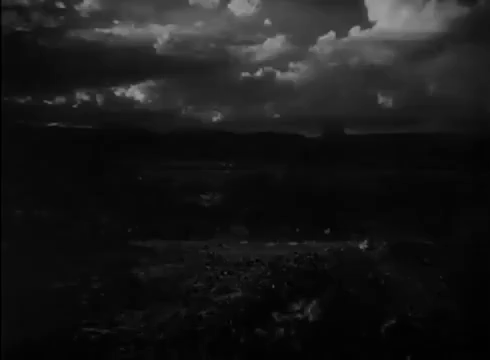
I get reminded that I haven’t watched a Criterion Collection film in a while, and the film begins with a rousing Western theme, courtesy of...holy shit, this movie has SEVEN COMPOSERS? Well, OK, courtesy of somebody in that list of seven. From there, we cut to a camp somewhere in the Arizona Territory in 1880. Which, again, is only 60 years prior to this film’s release date. There, a group of men discuss the danger imposed on them by the Apache, stirred up by the legendary warrior Geronimo.
And from there, we go to the town of Tonto, where stagecoach driver Buck (Andy Devine) lets a group of passengers out. One of these passengers is Lucy Mallory (Louise Platt), there to catch another shuttle to meet her husband in Dry Fork, New Mexico. However, the stagecoach gains an extra passenger in the form of the Marshal, Curley Wilcox (George Bancroft), who goes to find an outlaw also in Lordsburg.
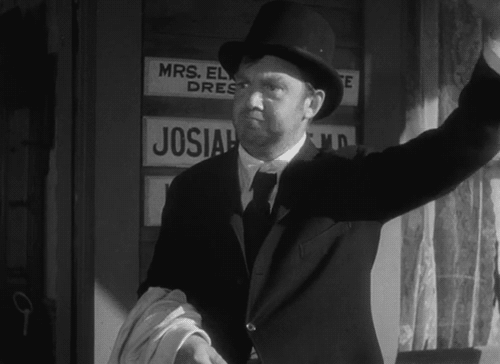
The passenger list builds with the addition of Doc Boone (Thomas Mitchell) and Dallas (Claire Trevor), a drunk and a prostitute both driven out of town by the Law and Order League of Women, due to social stigma affecting them both. In a bar getting a farewell drink, Doc meets yet one more passenger, Samuel Peacock (Donald Meek), a whiskey salesman that Doc is glad to meet. Meanwhile, banker Henry Gatewood (Berton Churchill) also boards the vehicle, under mysterious circumstances.
Friends of Lucy are worried with her travelling a drunk and a prostitute (the ABSOLUTE SCANDAL), but she needs to visit her husband in Dry Fork. As she leaves, she meets eyes with the dangerous but enigmatic gambler Hatfield (John Carradine). And before they’re able to leave altogether, the carriage is stopped by the army, who warn them of the Apache and Geronimo. All of the passengers refuse to get off, and YET TWO MORE passengers board to protect the carriage: the Marshal and Hatfield. And finally, they’re off! But as they head out, they’re stopped when they encounter a recently escaped outlaw.
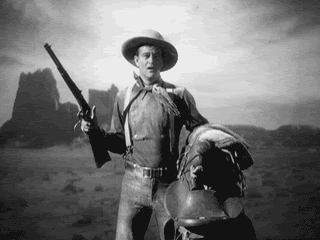
This is The Ringo Kid (John Wayne), who just got out of prison. The Marshal sees him, and takes him into custody on the way to Lordsburg, where they plan to drop him off into jail. And yes, he’s put on the fucking stagecoach. In total, we have Buck, the Marshal, Lucy, Hatfield, Doc, Peacock, Gatewood, and the Ringo Kid. Jesus, that’s a crowded-ass carriage, even if two of them are outside of it. Hell, Ringo’s sitting on the fuckin’ floor!
Anyway, the group interacts and introduces themselves. We learn that Doc once patched up Ringo’s brother, and was discharged from the Union Army for drunkenness. We learn that Hatfield is a true southern gentleman, and a veteran of the Confederate army (much to Doc’s ire), and that Ringo’s brother was murdered under mysterious circumstances.
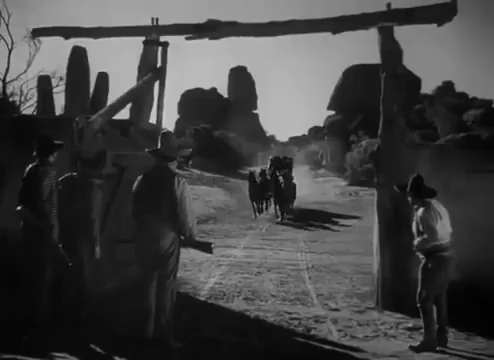
The group gets to Dry Forks, currently under occupation by the army. Said army had accompanied them (outside of the carriage, thank God) to Dry Forks, and are staying there to guard against the Apache. Meanwhile, Lucy’s dismayed to find that her husband isn’t in fact there. This leads to the debate of whether or not the party should go back to Tonto, or head onwards to Lordsburg. Buck wants to go back to Tonto, as does Peacock, while literally everybody else wants to go to Lordsburg. And so, they continue onwards.
Before heading onwards, the group sits for dinner, during which Ringo is the only one to show any form of kindness to Dallas, as everybody else looks down on her for prostitution. Shit, man, they won’t even sit near her at the table. Jesus. Unfortunately, Dallas is used to this cruel treatment, and it allows her to bond with Ringo in her loneliness. Once again, character interactions reveal things about our cast. Lucy is feeling quite ill, and Hatfield reveals that he served under her father in the Confederate Army.
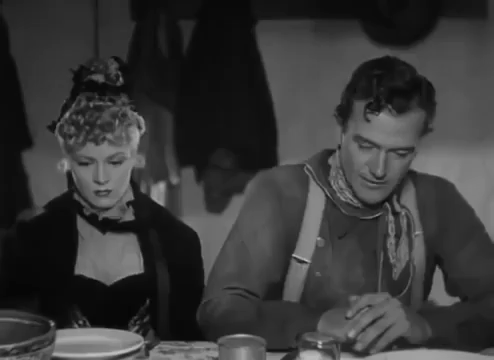
And from there, the coach continues on through the desert. Buck and the Marshal argue about letting Ringo free, as he aims to continue his feud with the outlaw Luke Plummer and his brothers, despite the fact that he’ll likely be killed by them. It’s for this reason that the Marshal wants to keep Ringo in his custody, as he was good friends with his father and doesn’t want to see him killed by the dangerous Plummers, whom Buck thinks should be taken down regardless.
Inside the coach, the banker reveals that he’s literally a Republican from 2016 (he rants about small government, and claims that a businessman should be President, holy shit), while people keep treating Dallas like shit, except for Ringo. They go through a cold mountain pass, which isn’t great for Lucy for some reason. It’s actually quite rough on everyone. Except for Doc Boone, who keeps drinking Peacock’s whiskey samples, which is hilarious.
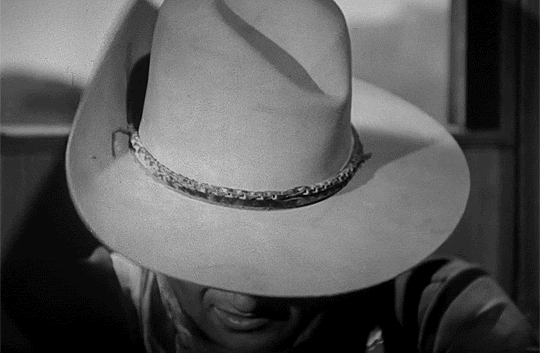
Finally, the group makes it to the next stop, Apache Wells. There, Lucy discovers that her husband has been severely wounded in a battle with the Apache, and she falls faint. Despite being absolutely SMASHED, Doc sobers up to help her, with the help of Ringo and the Marshal. Meanwhile, Dallas watches over her, despite the rancor that Lucy’s tossed at her this whole time.
The group stays the night, attended to by Chris (Chris Pin-Martin) a Mexican man who’s married to Yakima (Elvira Rios), an Apache woman who...is played by a Mexican singer. Huh. I mean...it’s still technically redface, unfortunately. But then again, the attitude towards Native American actors at this time was...oh boy. And the portrayal of the Mexicans in the camp aren’t exactly great, as a group of them steal the group’s spare horses, meaning that they only have one set of horses to use from here on out.
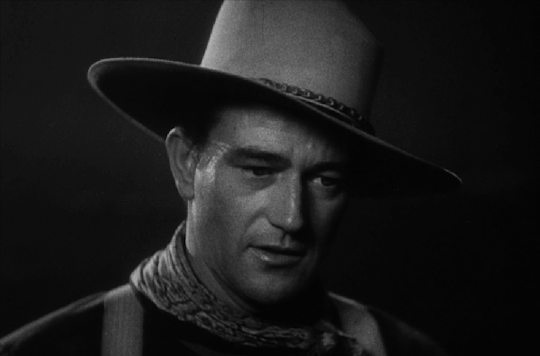
But amongst the unpleasant is a pleasant surprise, and the reveal of the cause for Lucy’s mysterious condition: she’s pregnant. Or rather, she was, as the baby’s just been delivered, and is being held by Dallas. As the group celebrates, Chris warns Ringo to stay away from Lordsburg, as the Plummers will kill him. But Ringo has something else on his mind.
See, on seeing Dallas with the baby, he finds himself quite in love with her. He finds her outside, and tells her that his father and brothers were killed by the Plummers. In turn, she reveals that her family was massacred on the real-life Superstition Mountain. Their conversation ends in Ringo proposing to Dallas, which she protests to because of her mysterious past.
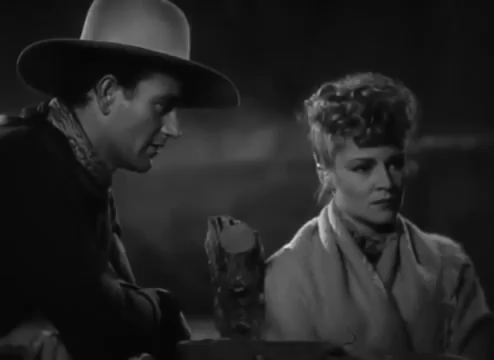
The next morning, Yakima’s left with Chris’ horse and rifle, and the group worry that she’s gone to tell the Apache. After Gatewood panics about his mysterious valise being possibly stolen, the group packs up and readies themselves to go. But Lucy is, of course, still ill from literally giving birth hours ago. Things are still tense between Lucy and Dallas, despite Dallas taking care of her the entire fucking night. Jesus, lady, that high horse is looking uncomfortable, you should get off it.
Dallas has something else to worry about, as she’s thinking on Ringo’s proposal. She consults with the doctor, who reminds her of her mysterious and checkered past being revealed if she goes. But she doesn’t seem to care, and she decides to accept the proposal. As for the rest, Gatewood’s freakin’ the fuck out. Because of Lucy’s condition, the doctor requests that they don’t leave until a day later. And Gatewood doesn’t give a single shit, as the Apache are close enough. Still, the party decides to stay, at Hatfield’s added insistence.
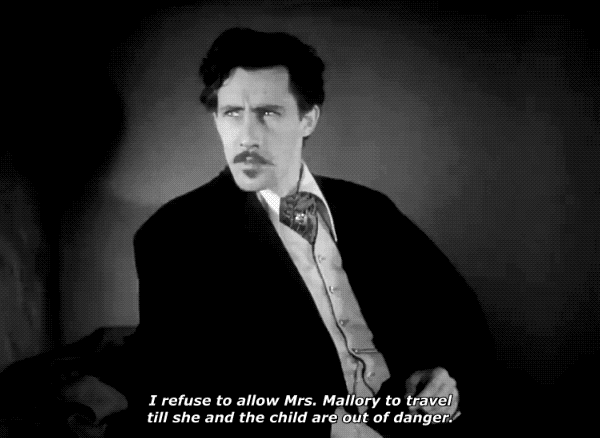
Ringo and Dallas talk, with Dallas both warning him of the Plummers, and also accepting his proposal. The men are all still arguing about whether or not they should leave, and they note that the Apache are likely between them and their destination. Ringo then takes the opportunity to escape and ride to Lordsburg for revenge on the Plummers. But he stops when he sees smoke signals on the hill. The Apache are coming.
No more waiting, it’s time to GO. Taking the still recovering lady and her newborn child Coyote into the stagecoach, they take off into the desert. Gatewood continues to run his loudmouth, to the ire of Hatfield and Ringo. And Peacock, to my delight, shows some kindness and “Christian charity” to Dallas, as she holds Coyote during the ride. And after all, they’re almost at the ferry!
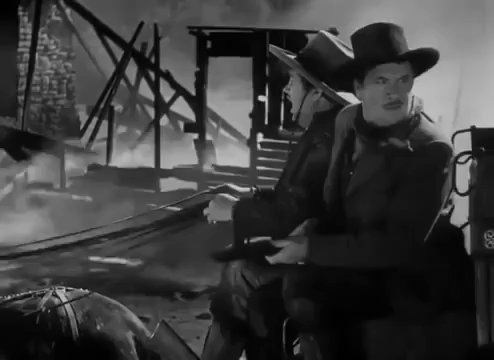
Ah, shit, the ferry! Looks like the ferry, and the entire town of Lee’s Ferry have been burned. And if they ford the river, all of their supplies could be flooded, or the oxen could drown! Or worse, dysentery could set in! That’s what The Oregon Trail taught me! And yet, despite this, that’s actually EXACTLY what they do! And unlike me literally every time I’ve every tried to cross a river without a ferry, they make it through fine! Realistic educational games my ASS!
But it’s not entirely safe, as the group are being watched by none other than the Apache, who make their way down to intercept the group. In the carriage, meanwhile, the group is thankful that they’ve made their way from danger, and even Gatewood relaxes a little. Doc Boone makes a toast, and everyone seems to be getting along for once.
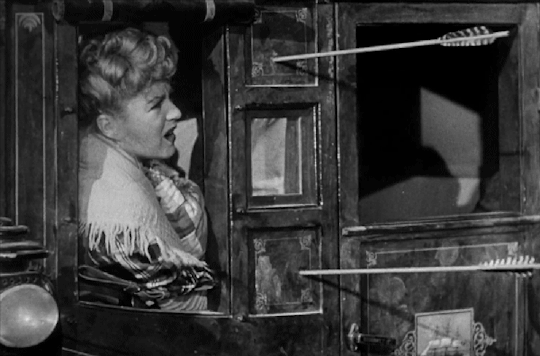
OH FUCK, PEACOCK GOT HIT!
The girlfriend IMMEDIATELY SAYS, “Now he really is Drew Peacock.” I leave and get boba to soothe my injured spirit from that well-timed joke. And then, the movie continues, and the chase is on! The Apache chase the stagecoach through the desert, and the groups trade gunshots and arrows, with Ringo shooting from the back. Gatewood panics so hard that Doc Boone punches him and IMMEDIATELY knocks him out, as he attends to Peacock’s injuries.
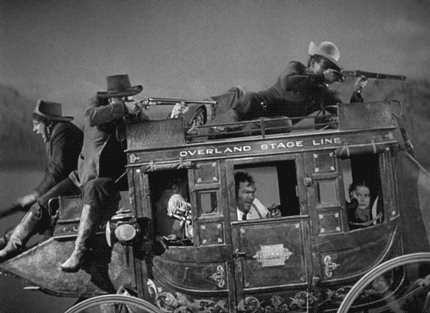
But despite their best efforts, the Apache group catches up to them, although many of them are killed by Ringo, the Marshal, Doc, and Hatfield. In the process, Buck is also shot, and Ringo literally jumps ON THE FUCKING HORSES, and commands them from the front like a goddamn badass. Things begin to get worse, as everybody in the stagecoach runs out of ammo, at the worst possible time. Hatfield only has one bullet remaining, and he considers using it...to kill Lucy! Holy fuck!
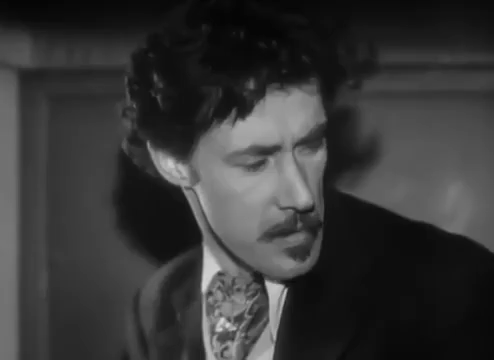
And just as he’s about to fire IN HER FUCKING FACE, the sounds of horns ring out as the cavalry arrives. And Hatfield, dick that he is, is shot. I think he was trying to spare her the indignity of being captured by the Apache, but Jesus, man! He collapses, and reveals that his father is a judge in Virginia before he...either passes out or dies, I’m not sure. The group finally gets to Lordsburg, where it turns out that Lucy’s husband is gonna be OK, and wasn’t severely injured. She tanks Dallas for everything that she’s done, and promises to help her should she ever need assistance. Good, finally, the lady needs a goddamn break.
The stagecoach rides through the busy town, and the arrival of the Ringo Kid gets the attention of Luke Plummer (Tom Tyler), who fetches his brothers Hank (Vester Pegg) and Ike (Joe Rickson). Time to get ready for a showdown, it seems. Dallas seems to know this, and goes to Ringo after the living Peacock (yay!) and the not-so-living Hatfield (oof) are brought in for medical help.
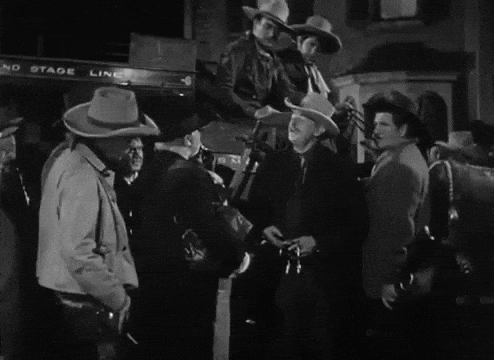
Buck’s also OK, but Gatewood isn’t. See, that valise he was carrying was actually full of money, and he had embezzled it from his own bank. He had counted on telegraph lines being down, so that he could escape with his ill-gotten gains, but has no such luck, and is led away in handcuffs! HA!
Ringo, meanwhile, is set to kill Luke Plummer and his brothers. The Marshal lets him escape, and promises to get Dallas safely down to a little ranch he owns in the South. Dallas and Ringo walk off together, and Dallas tries to get him to leave and say goodbye before he goes to his death, and before he finds out about her past (presumably as a prostitute).
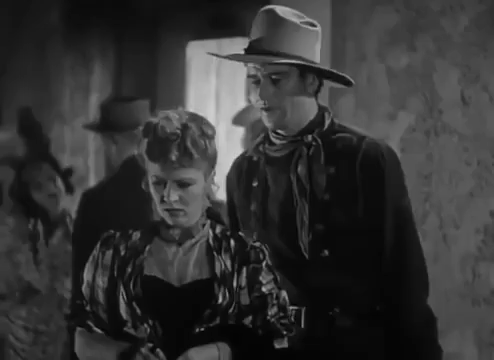
See, they’re actually walking up to a brothel, where Dallas is going to stay and work. Because, yeah, she’s a prostitute. Sucks that she’s been so maligned, because prostitution fuckin’ BUILT the Old West! I guess it’s easier to see that with historical context. As Ringo finds out the truth about Dallas (which he might’ve known all along), he still insists upon marrying her...and upon killing the Plummers.
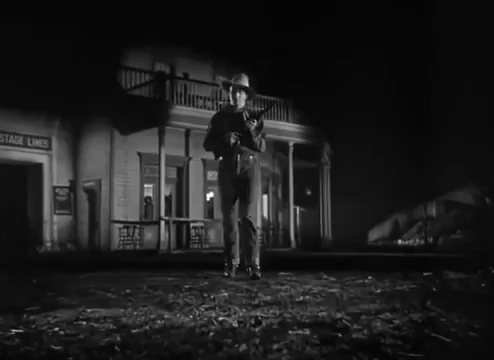
Doc, meanwhile, goes to the bar where the Plummers are waiting. He tells them that he’ll get them arrested, and Luke swears to come back for him after their business with Ringo is concluded. The brothers head outside, ready for the final showdown. It’s 3 on one, Plummers against Ringo. Ringo fires! A few more shots...then silence. And Dallas mourns.
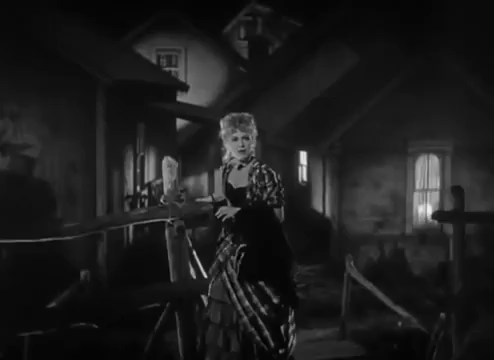
Except that Ringo wins the fight, and goes back to her! A happy ending! I’m sure that’ll be pretty goddamn rare this month. The Marshal arrives to take Ringo away, and Ringo goes as promised. She asks to ride with him a bit, and the Marshal agrees. He and Doc watch them get on, then cause the horses of the carriage to stampede away, letting Ringo and Dallas escape into the desert, together. And that’s the end!
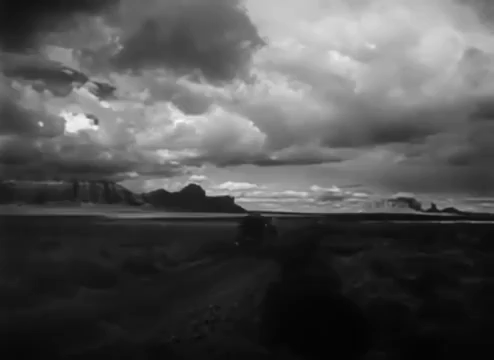
Y’know...I liked it! I really liked it!
This movie is often referred to as the greatest Western of all time, and the reason that the Western survived into the next several decades. And honestly, I get it! It was nominated for 7 Academy Awards, and won for Best Supporting Actor (Thomas Mitchell, AKA Doc) and Best Original Score, both of which were quite deserved!
Review time!
Cast and Acting - 9/10: Sure, it’s a little hokey. But at the same time, it’s good classic Hollywood acting! Wayne, Trevor, Mitchell, Carradine, and Devine are standouts for me, all of which serving their roles well. Also, fun fact about Andy Devine: he’s the voice of Friar Tuck in Disney’s Robin Hood! KNEW I recognized that voice!
Plot and Writing - 10/10: Standard plot? Sure. Engaging as hell? Hell yeah! This is just a good story, plain and simple. No holes, no problems, no mistakes, and purely straightforward. Great writing by the original story author, Ernest Haycox, and great screenplay by Dudley Nichols!
Directing and Cinematography - 10/10: Great looking movie, too! All credit to John Ford, unsurprisingly. Cinematographer Bert Glennon also deserves credit for the beautiful landscape shots throughout. Gogeous film, even in black-and-white!
Production and Art Design - 8/10: This is pretty standard Western production design, so not a lot to write home about specifically. However, that doesn’t mean it’s bad. To the contrary, it’s quite good! Just does stand out to me quite as much as other movies. Might be a nitpick, but it’s still something against the film.
Music and Editing - 10/10: No complaints! Seven composers definitely make their presence known, and you can tell that this score heavily informed all Western scores after it. It’s iconic, and it’s perfect for the mood. As for the editing by Otho Lovering and Dorothy Spencer...it’s great! Perfect pacing, well-edited...no complaints whatsoever.
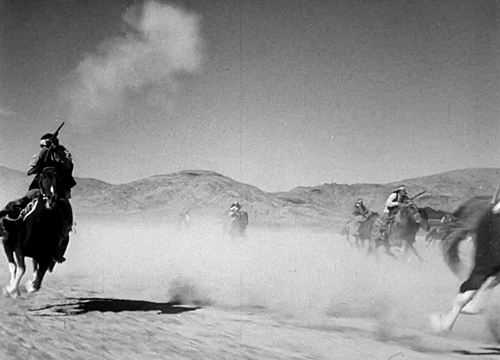
94%, and I had fun with this one!
I honestly did have quite a good time with this one. I can’t really call it a “fun” movie, but it definitely is a good one. Plus, it’s a John Ford/John Wayne film, which is basically a staple of the genre. So, what’s next?
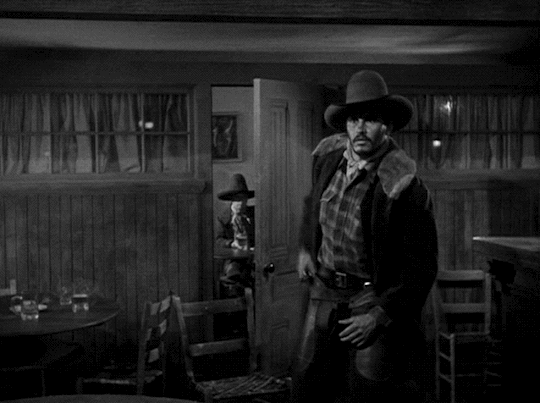
Next: My Darling Clementine (1946), dir. John Ford
#stagecoach#stagecoach 1939#john ford#claire trevor#john wayne#andy devine#john carradine#thomas mitchell#george bancroft#apache#western august#365 days 365 movies#365 movie challenge#western genre#user365#usersasha#my gifs#mygifs
9 notes
·
View notes
Text
The Iowa Caucus Happened

A job offer slides into Rafael’s DMs as he waits to find out if it’ll be a new start or prison on February 8.
Accidental Feminist Icon
Delete the Twitter app, Mr. Barba
“Mister Barba?”
Rafael didn’t like hearing his name from the young woman behind him, especially not given what he’d done. He’d texted Carmen on the first day of the trial, and she’d agreed to look into the offers from attorneys he knew, and some he didn’t, while he sat beside Dworkin and emotionally prepared himself to testify. The ones he’d looked at the night before came from people he didn’t like or were last resorts. He’d moved from his visceral response to finding law to back his actions. Applying logic could let him detangle himself from his conflicted emotions. Catholic guilt wrestled his humanity. That said, he also found himself desperate to introduce Ollie to music as Carmen worked from his apartment that first afternoon, not caring for once as the toddler drooled or sneezed or spilled all over him.
“Yes?” he asked, taking his coffee from the cart. “I’m sorry, have we met?”
“We haven’t. I follow you on Twitter.”
“Ah,” he said, shifting awkwardly. “It’s nice to meet you, Miss-”
“Rachel Sullivan. I have, like, a reading Twitter.”
“I’ve seen that! Read with Rachel? Your icon is a copy of Howl?”
“Yeah,” she nodded, chuckling. “I just- listen, I know it’s bad what’s going on and a lot of people are really hurt and going after you. Do I get it? No. But, I think you didn’t get a good choice, and you did what’s right for you. When it seems impossible, it’s not my place to judge something I can’t fathom. And a lot of people feel the same. A bunch of us have a group chat and we hope everything goes well and you get to start again.”
It was a stark contrast to his interaction with mami or emails from church ladies. There was an acknowledgement of disagreement, but he needed more people to respect that they weren’t there like she did. He also remembered watching his father die, and while he didn’t like the man, he regretted not ending that pain. It only drew out hurt for everyone.
“Thank you, Rachel. That really means the world to me.”
“Good luck today,” she said, giving him a wave when she took her coffee and left. By the end of the day, Rafael hated Peter Stone for being a damn good prosecutor, and he wondered if there were any cases he’d tried, especially the ones before SVU that he was wrong on. He made his way into a new bar, definitely not his usual during all of this, and he sat and drafted his resignation. It took longer than he cared to admit, and he restarted and reread it time and time again. By the time he was drunk, he’d written something he could proofread the next morning and ignored calls from Olivia, Carmen, and mami.
He decided it was time to do what he had been dreading, logging into Twitter. Since Carmen had cleaned it up, more people had found him, and he was able to easily ignore anything hateful by skimming for murder or murderer in the body of the tweet. He skipped those, and Rafael was surprised to see some apathy, sympathy, or respect for his reasoning. Lazily, he scrolled his direct messages. A select few of the people who knew him contacted him with revulsion, but his filtered messages were filled with vitriol. He found Rachel’s account again, following her back and deciding he could break his unspoken rule of only following people he knew or the occasional blog/podcast/museum/celebrity. If anyone contacted him with kindness, he was now more open to the reciprocity of Twitter; no one would be asking him to prosecute their case soon.
He saw a message from Tripp Greene. In Harvard, they’d had an unspoken alliance as the two scholarship kids in their cohort, a silent allegiance that continued into law school. There were very few people Rafael respected personally from Harvard, but Tripp had remained kind, even if he worked in something as ruthless as politics. They’d been reunited by Rafael’s uptick in Twitter popularity. He was more proud than he should be by the potential presidential candidates that had followed him. Rafael should have known Tripp would reach out; he was ever the silent cheerleader and had watched a sibling die on life support when he was at Harvard. They’d discussed the morality of pulling plugs and the selfish desire to keep people alive, though most of it had been Tripp talking and Rafael listening.
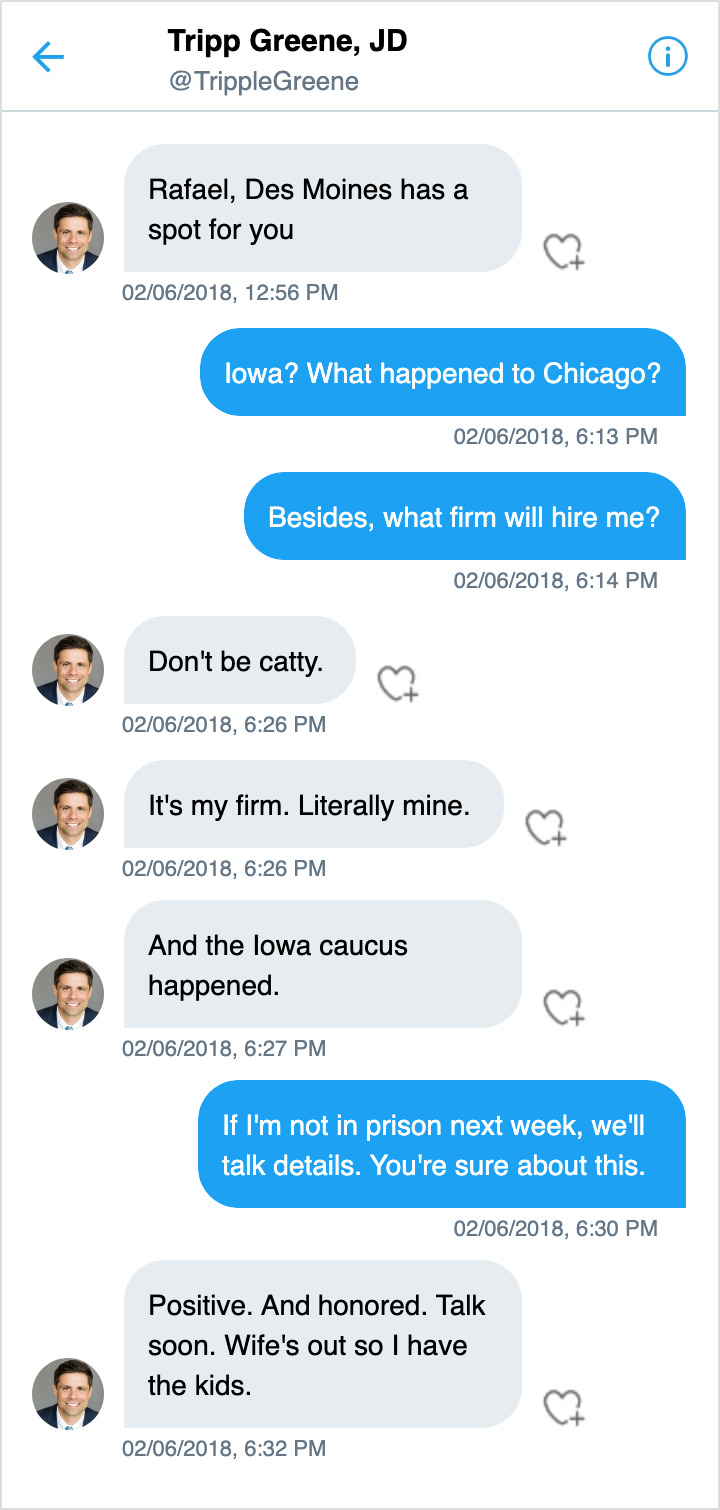
While moving to Iowa seemed extreme, he was acutely aware that he would end up haunting the DA’s office and Manhattan SVU like some ghost of ADAs past instead of moving forward. His mother had a boyfriend and looming retirement that seemed likely to take the pair to Miami, where she could play grandma to his grandchildren. There was nothing left for him here but Carmen, and while a great friend, she was not enough to erase the last twenty-one years of his life. When Carmen called for the fifth time that night, he ignored it, but it was quickly followed by Answer the phone or I tell Olivia I haven’t heard from you. With a groan, he answered when Carmen called again sixty seconds later.
“I’m fine. I don’t want to delve back into a play by play of my day.”
“That’s why you’re drunk at seven o’clock,” she said, her tone thick with sarcasm as she pretended that solved everything.
“It’s only been two hours?”
“You’re not at Forlini’s.”
“I’m not hanging out with Stone.”
“Send me your location. I just picked Ollie up from mom’s.”
“Take your son home, Carmen. I’ll be fine.”
“But we could talk about how much I also hate Stone. I’ll even stop and let you grab take out from that Cuban place you like.”
“Deal,” he acquiesced, motioning he wanted to close his tab. “Call me when you’re close.”
“Deal. ETA is about fifteen minutes.”
He polished off his scotch, signing the check and tipping well before taking his briefcase and leaning against the wall as he waited for Carmen’s SUV. She waved at him out the window, and he hurried into her passenger seat. Though he always knew that she was a great secretary and assistant, Carmen was proving to be the friend he needed right now. Olivia, in the few phone calls they had, was unwilling to discuss anything but the case. She was in cop mode, and she talked to him like she could swoop in and fix what he had done. While she thought he didn’t know, she’d talked to McCoy, talked to Stone, talked to anyone who would listen. But what she didn’t understand is that he’d accepted going to prison was a possibility, but it was one he felt was worth it.
“Barba!” he heard from the backseat, smiling softly to see Ollie more awake than he’d expected. He’d seen the boy periodically, mostly during evening handoffs when Carmen’s mother would drop him off so Carmen could take him home. There were a lot of single mothers in his life, and all were exceptional. The last few days, Carmen and Ollie both had spent a lot of time with him. He kept introducing Ollie to music and movies and foods like he could make up for everything Drew wouldn’t experience by making sure Ollie did.
“Oliver!” he smiled, twisting around to smile at him. The boy kicked his leg, and the blue stripe on the rubber of his sneakers lit up. “I like your shoes.”’
“Thanks,” he giggled, kicking again.
“You’re good with him,” Carmen smiled, the navigation now leading her to get his take out.
“He’s a good kid. Noah made me better with kids. Liv said I held him like a sack of flour at first.”
“You’ll be ready by the time you have your own.”
“I work too much.”
“That can change.”
“I don’t deserve to have a child,” he shrugged, and he could see Carmen purse her lips. “I don’t. I wouldn’t be good at it anyway. Wouldn’t be fair. Besides, I might end up like dad. No kid deserves that shit.”
“Bad word!” Ollie scolded, tablet in hand as he watched a movie.
“Sorry, Ollie. Stuff.”
“You’ve never told me what he did.”
“He wanted heterosexual, toxic machismo and got a swarmy, emotional bisexual.”
“You’re not that emotional.”
“He took care of that,” he said darkly. “I used to cry when he went after mami. That turned his attention to me.”
Carmen knew there was nothing she could say, so instead she silently took his hand, squeezing softly. He was taken aback at first, but he kept her hand loosely in his as his head lulled against the headrest. It was strangely grounding, the physical affection. He’d felt like he was swimming the last few days as memories of his father, his father’s death, his childhood, and each case he tried bubbled up. That wasn’t including the vision of baby drew and Maggie in the hospital room that lingered everywhere.
The conflicting guilt and conviction he’d done the right thing also broke a damn and the feelings he’d suppressed- loneliness, guilt, abandonment, distrust- were all bubbling to the surface. He’d spent so much of his life trying not to process them so he could focus on a conviction rate and moving forward that he didn’t have the tools everyone else did sometimes. Right now, Carmen felt like an anchor, and he was grateful for her.
He got out of the car when Carmen parked, ordering enough food for three adults, one take out container containing whatever he thought a toddler could handle. Soon enough, they were settled in his living room and eating, though Ollie had minimal interest in the pork, beans, and rice in front of him. The thought crossed his mind that when he took one of the out of state jobs, he wouldn’t have Carmen there like this. He was sure this friendship would be short lived; when he didn’t need her anymore, she’d leave him. That’s what usually happened, wasn’t it? She just felt bad for him.
“I’m moving to Iowa,” he blurted out before he was able to spiral into the self loathing he’d recently discovered.
“That’s far,” she said, and he thought he could detect sadness in her voice.
“There’s FaceTime.”
“Not quite the same, but I’ll take it.”
“Tripp understands,” he said, sobering up as the food hit his stomach. “He lost a sister. Watched someone dying like with my dad except she’d been born that way. It was years, Carmen.”
“That’s a lot. I’m going to miss you, Rafael. Ollie will too.”
“Come visit. If the tickets are bad, I’ll pay. Or cover renting a car.”
“You’re drunk,” she chuckled.
“Sorry. Best friend. It’s the rules.”
“We’ll come. But I can afford tickets.”
“Promise if it’ll make things tight, you’ll let me. You’re raising a kid. No kids means I can afford to get my friend the occasional plane ticket.”
“Deal.”
“Next week, will it be Des Moines or prison? Who knows! I’ll probably grow a beard either way. Think they’d recognize me in prison if I grow a beard?”
“I’ve never seen you with a beard. Stop shaving and we’ll find out.”
She could see Rafael getting tired, head leaning back against the couch and closing his eyes. She preferred when he joked about all of this. They were stuck waiting, and this time the next night they’d probably know. Ollie climbed between them on the couch, and she realized her boss wasn’t the only one almost asleep.
“You two can stay,” Rafael yawned, hand smoothing Ollie’s curls back.
“You’re sure?”
“Yeah. It’ll be nice not being alone in the morning. And you can stay here to work. We didn’t talk about it, but I know you hate Stone. He’s a good attorney. Doing his job.”
“His job is wrong.”
“That isn’t his fault. If another ADA had done what I did? I’d be prosecuting them.”
“Go get ready for bed,” she chuckled, rolling her eyes. As she scooped Ollie up, she kissed the top of Rafael’s head. “We’ll see you in the morning.”
“Carmen?” She turned in the doorframe. “Thank you. For all of this.”
“I’m glad to, Raf. Promise you’ll actually sleep.”
“I promise.”
“Night, Barba,” Ollie yawned, waving over his mom’s shoulder as they entered his guest room. Maybe Iowa was going to be too far if he didn’t go to prison. He was getting quite fond of having Carmen around quite quickly. He wasn’t going to be her superior anymore, so this friendship could be something he maintained.
Olivia would be a given; even if they were primarily united around work, she was also one of his closest friends and maybe not working together would make him relax. Hell, maybe the end of his life in the city would do it. Rafael couldn’t remember a time he hadn’t felt he was chasing an upward trajectory in New York City. Even at Harvard, the plan had been to return. Maybe coming into Des Moines established would let him feel comfortable just existing.
He liked cooking and reading in the park and going out dancing on occasion. He rarely had time for two options, and the latter made his cheeks red with embarrassment at the prospect of a colleague seeing him during the outing. In Iowa, maybe he could go dancing and take up a new hobby and wear jeans without feeling like something was out of his control.
He woke up before Carmen, excited to be able to cook for her. He appreciated the fact she was happy to help him, but she had paused her own life for the last few days. Their friendship was relegated to offices and dinners by the office. He’d come to her baby shower and birthday parties and even a holiday party, but that was it and that had other colleagues present. Except maybe the baby shower, but he was determined to buy up whatever was left on her registry when the day came, using mami, abuelita, and the older women at church as pseudonyms to pretend he’d just let family know.
“You can cook?”
“I just never had time,” he shrugged, tray coming out of the oven.
“You made pastries?”
“Pastelitos de guayaba.” Carmen didn’t miss how proud he looked as he admired them. They were something he’d always made with family. “They aren’t hard, but abuelita used to make them for me all the time. Puff pastry, sweetened cream cheese and guava paste. Cafe con leche on the way.”
“You couldn’t sleep?” He shook his head, pouring the espresso and adding the milk before placing mugs at the breakfast counter. His mouth was set in a line now, the corners sucked in as he focused on the countertop. Her hand rested on his, giving a squeeze and he rewarded her with a soft smile. “We’ll be helping you pack for Iowa in no time.”
“I hope,” he nodded, biting into a pastry. Ollie came out, eyeing the countertop. “Want one, Oliver?”
“What are they?”
“Delicious,” Carmen groaned, having torn into her own. That was enough for Ollie, who accepted a pastry from Rafael with a soft Thank you before biting into it carefully.
“Wow! It is good!”
“I’m glad you like it.”
It felt a somber affair, despite the pastries, when Carmen saw him off to court. She chose to wait in his apartment, ringer on high and news coverage on. Ollie was easily entertained by the toys she had in the car, and the phones were forwarded to be answerable on her cell phone. By the end of the day, she’d put dinner in his slow cooker and cleaned most everything at least once. And then her phone rang with his ringer. She’d picked one of the other presets for him long ago, and she watched Ollie with his blocks as she answered.
“Rafael?”
“Not guilty,” he exhaled, still unable to believe it as he surveyed his office to begin packing. Her desk was empty, and he didn’t mind today because if she had been here, McCoy would’ve had her helping Stone. Carmen was his assistant, his friend, and it was bad enough to know Stone would probably take his place at work.
“Thank God,” she whispered. “Did you turn the letter in?”
“I put it on Jack’s desk. I’m hoping to be gone buy his return. I think three heavy boxes will cover it. Plus anything I hung, but other than diplomas most of it came with the place.”
“I put dinner on. Ollie and I ran to the store and picked up short ribs and potatoes and carrots. I needed something to do.”
“Nervous you’d be visiting me in prison?”
“You know damn well juries can be swayed. You’ve done it.”
“And I’m safe. I’ll be there in a couple of hours, okay?”
“Okay,” she said softly. “I’m really glad you get to go to Iowa.”
#Rafael Barba x Carmen#rafael barba x reader#law and order svu#law and order special victims unit#svu
21 notes
·
View notes
Text
Media Rediscover Afghan Women Only When US Leaves

Just as US corporate news media “discovered” Afghan women’s rights only when the US was angling for invasion, their since-forgotten interest returned with a vengeance as US troops exited the country.
After September 11, 2001, the public was subjected to widespread US news coverage of burqa-clad Afghan women in need of US liberation, and celebratory reports after the invasion. Time magazine (11/26/01), for instance, declared that “the greatest pageant of mass liberation since the fight for suffrage” was occurring, as “female faces, shy and bright, emerged from the dark cellars” to stomp on their old veils. In a piece by Nancy Gibbs headlined “Blood and Joy,” the magazine told readers this was “a holiday gift, a reminder of reasons the war was worth fighting beyond those of basic self-defense” (FAIR.org, 4/9/21).
The media interest was highly opportunistic. Between January 2000 and September 11, 2001, there were 15 US newspaper articles and 33 broadcast TV reports about women’s rights in Afghanistan. In the 16 weeks between September 12 and January 1, 2002, those numbers skyrocketed to 93 and 628, before plummeting once again (Media, Culture & Society, 9/1/05).

Suddenly remembering women
Now, as the US finally is withdrawing its last troops, many corporate media commentators put women and girls at the center of the analysis, as when Wolf Blitzer (CNN Situation Room, 8/16/21), after referring to “the horror awaiting women and girls in Afghanistan,” reported:
President Biden saying he stands, and I’m quoting him now, squarely, squarely behind this decision to withdraw US forces from Afghanistan, despite the shocking scene of chaos and desperation as the country fell in a matter of only a few hours under Taliban control, and the group’s extremist ideology has tremendous and extremely disturbing implications for everyone in Afghanistan, but especially the women and girls.
This type of framing teed up hawkish guests, who proliferate on TV guest lists, to use women as a political football to oppose withdrawal. Blitzer guest Rep. Adam Kinzinger (R.-Illinois), for instance, argued:
Look at the freedom that is being deprived from the Afghan people as the Taliban move into Afghan, or moving into parts of Afghanistan now, and you know how much freedom they had. Look at the number of women that are out there making careers, that are thought leaders, that are academics, that never would have happened under the Taliban leadership…. The devastation you are seeing today is why that small footprint of 2,500 US troops was so important.
Sen. Joni Ernst (R.-Iowa) gladly gave Jake Tapper (CNN Newsroom, 8/16/21) her take on the situation after CNN aired a report on the situation for women:
As you mentioned, for women and younger girls, this is also very devastating for them. The humiliation that they will endure at the hands of the Taliban all around this is just a horrible, horrible mar on the United States under President Joe Biden.

‘America rescued them’
Charity Wallace claimed in the Wall Street Journal (8/17/21) that Afghan “women and girls…made enormous progress over the past 20 years.”
Such analysis depends on the assumption that the US invasion and occupation “saved” Afghan women. In the Wall Street Journal (8/17/21), an op-ed by former George W. Bush staffer Charity Wallace ran under the headline : “The Nightmare Resumes for Afghan Women: America Rescued Them 20 Years Ago. How Can We Abandon Them to the Taliban Again?”
Two days later, a news article in the Journal (8/19/21) about the fate of women in Afghanistan explained: “Following the 2001 invasion, US and allied forces invested heavily to promote gender equality.”
The Associated Press (8/14/21), in a piece headlined, “Longest War: Were America’s Decades in Afghanistan Worth It?,” noted at the end that “some Afghans—asked that question before the Taliban’s stunning sweep last week—respond that it’s more than time for Americans to let Afghans handle their own affairs.” It continued, “But one 21-year-old woman, Shogufa, says American troops’ two decades on the ground meant all the difference for her.” After describing Shogufa’s experience for five paragraphs, the piece concludes with her “message to Americans”:
“Thank you for everything you have done in Afghanistan,” she said, in good but imperfect English. “The other thing was to request that they stay with us.”
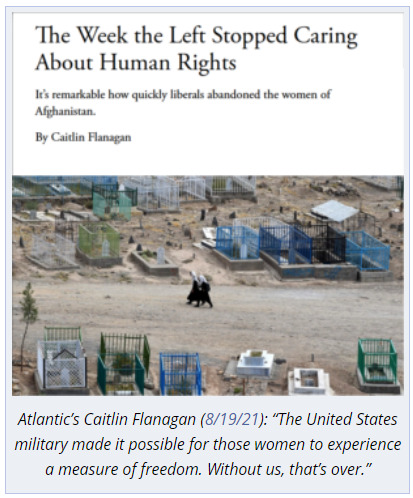
Perhaps the most indignant media piece about Afghan women came from Caitlin Flanagan in the Atlantic (8/19/21), “The Week the Left Stopped Caring About Human Rights.” Flanagan argued:
Leave American troops idle long enough, and before you know it, they’re building schools and protecting women. We found an actual patriarchy in Afghanistan, and with nothing else to do, we started smashing it down. Contra the Nation, it’s hard to believe that Afghan women “won” gains in human rights, considering how quickly those gains are sure now to be revoked. The United States military made it possible for those women to experience a measure of freedom. Without us, that’s over.
Flanagan pointed to Afghan activist Malala Yousafzai, whom she accused “critics of the war” of forgetting, saying Yousafzai “appealed to the president to take ‘a bold step’ to stave off disaster.”
Next to last in women’s rights
Such coverage gives the impression that Afghan women desperately want the US occupation to continue, and that military occupation has always been the only way for the US to help them. But for two decades, women’s rights groups have been arguing that the US needed to support local women’s efforts and a local peace process. Instead, both Democrat and Republican administrations continued to funnel trillions of dollars into the war effort, propping up misogynist warlords and fueling violence and corruption.

Contra Flanagan’s insinuation, Yousafzai didn’t ask Biden to continue the occupation. In an op-ed for the New York Times (8/17/21) that most clearly laid out her appeal, she asked for humanitarian aid in Afghanistan and for refugees fleeing the country. In fact, her take on the US occupation’s role in women’s rights (BBC, 8/17/21) is much more critical than most voices in the US corporate media: “There had been very little interest in focusing on the humanitarian aid and the humanitarian work.”
As human rights expert Phyllis Bennis told FAIR’s radio program CounterSpin (2/17/21), Malalai Joya, a young member of parliament, told her in the midst of the 2009 troop surge that women in Afghanistan have three enemies: the Taliban, warlords supported by the US and the US occupation. “She said, ‘If you in the West could get the US occupation out, we’d only have two.’”
Things did get better for some women, mostly in the big cities, where new opportunities in education, work and political representation became possible with the Taliban removed from power. But as Shreya Chattopadhyay pointed out in the Nation (8/9/21), the US commitment to women was little more than window dressing on its war, devoting roughly 1,000 times more funding to military expenses than to women’s rights.
Passive consumers of US corporate news media might be surprised to learn that Afghanistan, in its 19th year under US occupation, ranked second-to-last in the world on women’s well-being and empowerment, according to the Women, Peace and Security Index (2019).
As the Index notes, Afghan women still suffer from discriminatory laws at a level roughly on par with Iraq, and an extraordinarily low 12.2% of women reported feeling safe walking alone at night in their community, more than 4 points lower than in any other country. And just one in three girls goes to school.
Wrong kind of ‘help’
In 2015, a 27-year-old Afghan woman named Farkhunda Malikzada was killed by an angry mob of men in Kabul after being falsely accused of burning a Quran; US-backed Afghan security forces watched silently (Guardian, 3/28/15). The shocking story spread around the world, but the only US TV network to mention it on air was PBS (7/2/15), which offered a brief report more than three months after the murder, when an Afghan appeals court overturned the death sentences given to some of the men involved.
FAIR turned up no evidence of Caitlin Flanagan ever writing about Malikzada, either—or about the plight of any Afghan woman before last week.
According to a Nexis search, TV news shows aired more segments that mentioned women’s rights in the same sentence as Afghanistan in the last seven days (42) than in the previous seven years (37).
The US did not “rescue” Afghan women with its military invasion in 2001, or its subsequent 20-year occupation. Afghan women need international help, but facile and opportunistic US media coverage pushes toward the same wrong kind of help that it’s been pushing for the last two decades: military “assistance,” rather than diplomacy and aid.
For more than 20 years, US corporate media could have listened seriously to Afghan women and their concerns, bringing attention to their own efforts to improve their situation. Instead, those media outlets are proving once again that Afghan women’s rights are only of interest to them when they can be used to prop up imperialism and the military industrial complex.
2 notes
·
View notes
Text
TW: simply just a sad spick fic. I thought of it and it made me sad. Might write it but at the same time i read enough books about old men so.
AU where Spock dies on a mission in the past, severing their bond. This was years ago, and Jim is getting remarried. Hes an elderly retired admiral, and hes marrying a woman who had lived with him and cared for him while he was stationed on earth, his captain days far behind him.
Its like a collection of snippets as Jim and his wife, who he feels very affectionate towards, go on vacation to like thailand and it reminds him of a mission where him and Spock were stranded due to a transporter failure and they had to figure out how to get off the planet.
Their little home in iowa, the refurbished farm and Jim's kids come home for the holidays. He remembers when he first brought Spock to his home on shore leave, the house standing empty for many years while his mother and brother were away.
They attend either a funeral for Bones, or Scotty or another admiral and he remembers burying Pike, with Spock as his bondmate for emotional support. He holds his wifes hand, reaching out for her mind but only finds the empty spot where the bond had withered and died.
But also with happy moments between them. She makes his favourite pie he has ever tasted. She is so brave and an accomplished starfleet captain in her own right. She is consulted still in her old age for advice on interstellar aid, and volounteers in the community.
The last scene has gotta be Jim dying. Like just something all old people go thru, like liver failure from an alien poison he inhaled over 50 years ago. He is saying goodbye to his friends and family. His children, his neices and nephews, his grandchildren. What remains of the bridge crew and their children. Is Sarek still kickin? Maybe. But the last person he says goodbye to is his wife. And she is so excited for him to join with Spocks katra once again, and he fuckin boldly goes into his last adventure.
10 notes
·
View notes
Text
Football finalist Derek Barnett.
Football finalist Derek Barnett. 5 in the country in total defense. The strife that is being stirred up is not to take away anything that belongs to another,—neither their silver or gold, their fine linen or purple, their houses or land, their horses or cattle, or anything that is their property; but to rescue a neighbor from their unmanly cupidity.. Should serve as a warning, said NBI Anti human trafficking chief Janet Francisco, who leads the case. Neal Barnard to speak at community wellness event July 19 at the Fargo Theatre. But unfortunately for a lot of women, Estrogen told zapatillas de tacos futbolyour mind to stop developing your breasts before these were as big as you would like. El nuevo color de Nike marrn nuevo, nike air max 90 baratas hombre y tal vez este es el tipo de zapato ltimo lanzamiento de nuevos productos. The eunuch had looked death in the face, so near he might have kissed her on the lips. With stifled indignation he turned his eyes away from the tactless guest, muttered something to himself, and took refuge behind the newspaper. From here, your only option is a horsedrawn Cobb Co. The body weight of an individual, or body fat to be more specific, will impact the oxygen intake capacity or VO2 max
izraeli kézműves ékszerek
of that individual (a bit on that later). And Qarth … I have never done the Qartheen any harm …”. It was not the prudent course, but he was tired of prudence, sick of secrets, weary of waiting. Ramsay will kill them all, of course. The application forms which must be completed by students, their spouses, and their parish priests, cover a much broader area than academic abilities. Doctors discovered Ethan Fisher, the 6 year old son of Candi and Florida State football coach Jimbo Fisher, has Fanconi Anemia, a rare blood disease inherited from a gene in both parents that decreases production of blood cells and eventually leads to bone marrow failure. Insufficient time with only 10 minutes left baby nike trainers for a 30 minute question at the end of the exam needs a special approach. He had hurried off from me straight to the prince’s, had not found him at home and had left a note for him. "There aren't very many good men these days. Put it on, Natasha. And Slynt names you a turncloak.”. This was nothing he had wanted. Young firefighters haunted by finding one of their own inside the crumpled car. One would hope so. Peirce, Esq., and taken up as a runaway slave by William S. Patchface. Christian, 5 11, 210, jr.; Clayton Moore, Millersport, 5 9, 160, sr. At Chris Carter's suggestion, the order of episodes was shuffled to help clarify a subplot about their son's adoption.. Hockey fell by the wayside. The reliance on surface transportation is clogging the region roads, contributing to pollution, retros kabátok and causing undue wear on roads, raising maintenance costs, the study states.. What CSU brings to the table in the money sport is a beautiful new 41,200 seat on campus stadiu, set to open next season. Nova Scotia Nunavut Ohio Oklahoma Ontario Oregon Pennsylvania Prince Ed. And then, totally unexpectedly, AW comes over out of nowhere and says hi. The building had been hit. Vernon Vipers forward Michael McNicholas cashed in on a loose puck in front of the Vees net and hammered it past adidas mariposasgoalie Olivier Mantha, ending the Vees' RBC Cup dreams on March 22. Even with Gimre Shoes Inc. She was glad of that. 243 8935.. John Denning won’t buy her. As a cool blue dawn broke over the city, Dany walked out onto the terrace. Only the Dreadfort uses pink sealing wax. It was dusk and the red priest had lit his nightfire in the great iron brazier amidships as the crew gathered round to pray. Her cheeks were flushed and red, and her eyes sparkled.. I be right back, I got to take this call. "If the president says 'x,' it's hard for his own
bocanci grisport 480
lawyer to credibly walk that back and say 'not x,'" said Andrew Schilling, the former civil division chief of the United States Attorney's office in Manhattan. “What darling little creatures you are,” he said. CHICAGO (AP) Researchers tried a big serving of food psychology and a dollop of trickery to get diners to eat their vegetables. You can ask for some miles or a voucher, but you can demand either.. They didn't even ask us to sit in the trunk.. It is so fine.”. “Your father’s bannermen seem to have no liking for my cause in any case. She did not speak to me of her own accord, but seemed to be angry with me. Mormont emerged from the cramped confines of the cage bent and squinting, with both eyes blackened and his back crusty with dried blood. Tolling director Rubstello said it a possibility, but not for a long time. I remember one evening, getting my shirt pulled off me and they writing all over my body and throwing my shoes out the window. The new bins are the latest enlargement in a trend toward accommodating more bags, which have become increasingly necessary as fliers. The Muskies led the game by a score of 5 2 at the end of two innings and never trailed the remainder of the game. Southeastern Afternoon Art Workshop SLU
sandisk mp3 mode d emploi
Clark Hall, North Pine Street, Hammond, 70402. There also better support for multiple displays; now, users can view docks and menus across more than one display, and you can hook up an HDTV using AirPlay and Apple TV as a secondary display as well, which opens up some interesting geci de fas dama scurte viewing options in the living room. And still the Great Masters gathered atop their lofty pyramids to complain of how the dragon bikes btt usadas queen had filled their noble city with hordes of unwashed beggars, thieves, and whores.. A man residing near the village—a vans giniss bachelor, thirty years of age—became embarrassed, and executed a mortgage to my employer on a fine, likely boy, weighing about two hundred pounds,—quick-witted, active, obedient, and remarkably faithful, trusty and honest; so much so, that he was held up as an example. The sea was never silent. Wordless, King Stannis walked away, back to the solitude of his watchtower. District judge Brian Sandoval, former state Assemblywoman Sharron Angle won the Silver State primary and the right to challenge Senate Majority Leader Harry Reid (D) this fall, former Iowa Gov. ''That's how the Wishbone works,'' said Dowis, who is nursing a bruised knee but should be OK for Saturday's game against Colorado State. Entering the park from the northwest corner, one passes through a small pylon gate with a painted relief of a scene from the Egyptian afterlife: the baboon of Thoth preparing to weigh the hearts of the dead against the feather of Ma'at. Lessons and most equipment usage are free for club members.. So we spend $1.2 million a minute on a military complex that creates thousands of jobs, trains thousands of young men and women to fight and creates fear of us around the world. Exotic skins such as python, eel and stingray ratchet up costs even more. The new Lions way should be to cut ties with players just as the money goes up and the level of play goes down.It helps greatly that Belichick controls all facets of the franchise.
1 note
·
View note
Text
Seventy Two Hours
kirk/spock
star trek: tos
quarantined together!
~2.4k
for @wanderingcas ...’cause she asked for it. ;)
Fifteen steps.
Turn.
Nine steps.
Turn.
Fifteen.
Nine.
“It hasn’t changed in the past hour, Jim.” Spock doesn’t open his eyes, just speaks wearily into the echoey, empty space.
He wants to glare back at the Vulcan, but he’d probably see it even with his eyes closed. Of course it hasn’t changed in the past hour. It hasn’t changed in the past sixty eight hours and–he glances at the screen on the wall–thirteen minutes. And fifty-four seconds.
But what else is he supposed to do?
He goes back to pacing the perimeter of their isolation chamber.
Spock sighs. “Jim…”
“Yes, Spock?”
But Spock doesn’t seem to have an answer. Good. Kirk doesn’t need a lecture right now. Especially when he can’t escape.
*
“Bones, there’s got to be another way.” Kirk is frantic, practically pleading. “Don’t tell me there are no other isolation cells on this ship–I know every inch, she’s my ship. Hell, I’ve even been held in several of the other cells before, as I know you can recall, since you’re the one who gave the orders. So what’s this about?”
McCoy is not cowed by his captain’s protests. “Look, Jim, I can’t let you out, not when there’s a chance you could infect the crew. And none of the other cells are available, so I can’t beam you to one of them, even if I thought that was advisable.” At that Kirk smiles, sure he can convince Bones to beam him somewhere, anywhere–his quarters, back to the planet that got him into this mess, the vacuum of space–but the level gaze from the doctor knocks that idea flat. Bones crosses his arms over his chest and repeats, “If I thought that was advisable. Which I don’t.”
Kirk lowers his voice, makes it almost too low to hear, and this time he is pleading. “Bones. You know why I can’t stay here. You know what this’ll do to me.” He closes his eyes, then says one more time, “Please.” He can’t look when he says it. He already knows the answer.
“Sorry, Jim. It’s only three days. If it’s any consolation I don’t think you were actually exposed, but we have to be sure.” He looks at Kirk, then at Spock, then shrugs. He knows what he’s putting Kirk through. He reaches out like he wants to put his hand on Kirk’s shoulder, but of course he can’t. The wall may be invisible, but it still exists. Nothing can get through it, in either direction. There’s a small airlock in the corner for delivering food, and a bathroom in the other corner; the walls to that are invisible too, for the moment, but when someone wants to use it they become opaque, and the door appears. Quite clever, these isolation cells. Keep all the germs on one side or the other.
“Are you alright, Captain?”
Kirk turns to see Spock’s concerned look.
Yes, they do an excellent job of keeping the germs where they belong. And sometimes they also trap a man inside with another man.
“Fine, Mr. Spock. Just fine,” Kirk says, his voice infused with false cheerfulness.
The man he’s been in love with for months now.
*
When he gets tired of pacing, Kirk hops onto his bed, flops onto his back, and stares at the ceiling. There’s a crack about four inches from the wall. It’s about six inches long and is shaped like an elongated letter S.
It’s not actually a crack. He thinks it’s probably a scratch. But he can’t figure out what could scratch the ceiling.
He’s been puzzling it out, off and on, for nearly sixty nine hours now.
Anything, absolutely anything, is better than thinking about the man sitting on the bed next to his.
(This both is and isn’t the honest truth. Thinking about Spock fills him with a lightness, a warmth, he’s never really felt before, and in his clearer moments he knows he’s never experienced anything more lovely. It’s sometimes–quite literally–breathtaking. But it’s also an exquisite kind of torture, being trapped here in this tiny space, wanting to look his fill, wanting to touch, wanting to kiss, but being forced to keep his distance.)
“Why do they make these things so small?” he wonders aloud. “We can barely move in here. It’s a wonder we can even breathe.”
“I assure you there is plenty of oxygen, Captain. All scrubbed and filtered so as to be safe for us to breathe. Although I daresay the more dangerous would be for someone outside to breathe our air.”
“It doesn’t feel like it, Spock. It feels small and crowded and airless.” He risks stealing a glance, then looks fixedly back at the ceiling.
Spock is silent for a moment, as if he’s contemplating something. Then he says, “After Iowa, being anywhere on the ship must feel confining. I’ve never been there, but we have places like that on Vulcan. Wide open plains, big sky. After visiting a place like that, everything feels small. And you lived in Iowa for years.”
Kirk’s heart lifts at the mention of his childhood home. “I fell in love with the stars in Iowa,” he tells Spock. His voice hitches ever so slightly on the word love, but he keeps moving quickly, hoping Spock doesn’t notice. “You’re right about the sky, so big, and it always felt so close, like if you could just get high enough on your tiptoes you’d be able to run your fingers along it and feel something like velvet, only softer.”
He rolls onto his side, angling his body so he can look at Spock now; he feels vulnerable, talking about feelings with the Vulcan, but he’d been the one to bring it up. He goes on. “Most of the time my ship is enough. I’m quite literally among those stars now, Spock, though I still can’t touch them. But I’ve stood on other planets, and I live on a ship that navigates through starlight instead of waves. I just don’t like being trapped, especially when I can’t see outside.”
Spock is silent, contemplating, then says, “Were you ever trapped as a child?”
Kirk can’t stop the slight widening of his eyes, the small jerk of his head. But he manages to keep his voice steady. “Once. I was...small. Maybe five? Six? I don’t remember exactly, it’s…” He takes what he hopes will be a calming breath. “It’s somehow both a muddle and very clear in my mind.”
He’s probably imagining it, but he thinks he sees Spock’s eyes...soften.
“It was summer. We had a lot of storms in summer, thunderstorms rolling across the prairie, loud and fierce. But that summer, that hot July afternoon, the air suddenly stilled. It was eerie; the animals went quiet, even the birds roosting somewhere as if waiting for something to happen. And then the sky turned a sickly green, and we all knew what that meant.” He swallowed reflexively, remembering.
“I believe you call the phenomenon a tornado,” Spock says, his voice gentle.
“Yes,” Kirk says. He’s looking at Spock but he doesn’t see him. He sees a tree against a green sky. He hears Spock’s voice but only just; mostly he hears the rush of wind so relentless it eats houses and pulls one hundred year old trees up by their roots. “We had a shelter, everyone did. There was nothing about the shelter that should have made it any more frightening than any other place we lived, but somehow it was. It was just as brightly lit as my bedroom, but somehow it always seemed more shadowed, like something unfriendly was hiding just beyond my sight. There wasn’t, of course, it was just the fear of the storms that made me feel that way when we went down there, but you can’t make a small child understand a thing like that.”
Spock makes a small noise and Kirk looks up to see an odd look on the other man’s face. “Right,” Kirk says with a crooked smile. “Vulcan logic. I’ll bet you weren’t frightened of anything so mundane as storms when you were a kid.”
Eyebrow raised, Spock says, “On the contrary. I didn’t like storms at all. Or darkness, at least for a little while. But I learned to control my fear, so it couldn’t control me.”
A pang of sadness lances through Kirk’s middle, and at first he doesn’t understand why. Spock had mastered his fears, why should that be sad? And then he slips back into the memory of the tornado, of the stillness and the horrible green sky. He’d been out of his mind with terror; even that young he knew what those things meant. He’d been screaming for his mother, and when he found her he’d been shaking with fear. But she’d wrapped her arms around him, murmured into his hair, and together they’d run to the shelter, hand in hand.
Spock had mastered his fears. But who had been there to hold him, to reassure him, even to hold his hand?
But saying that out loud gets much too close to his own feelings, so he leaves those thoughts behind. “We survived the storm alright; our shelter was good and safe. But when the all clear came through the computer and we tried to get out the door wouldn’t open. The lock was disengaged, the latch opened, but the door wouldn’t move. Not an inch.” His heart races at the memory, the acrid taste of fear rises in his throat. “A tree had been dropped onto our shelter door. Later we realized it wasn’t even our tree–all of the trees on our property were right where they belonged. But tornados don’t care where they drop things, they just pick them up and let them go. It was a big, heavy tree, heavy enough to trap us in our storm shelter.”
Kirk looks back up at the ceiling, at the odd scratch, or crack or whatever, that he’s been staring at for hours on end. “We called for help, but we had food and water and air so we were low priority. It was nearly eight hours later when a rescue crew finally got the tree off our door.” He drapes an arm across his eyes. He’s not sure if he’s hiding or just changing positions. Possibly both. “The shelter seemed to get smaller by the hour. By the minute. By the time they opened the doors it felt about as big as a dollhouse.”
He’s so lost in the memory, so keyed up from being so close to Spock for so long, his body works on autopilot, jumping off the bed and preparing to resume pacing before he’s even conscious of his decision to move. “So that’s the story, Spock. I don’t like to be trapped. I much prefer open spaces, or,” he grins at his own cleverness, “just space, as it were.”
“Captain,” Spock says, reaching out a hand to stop Kirk’s attempt to begin nervously pacing again.
Kirk freezes.
“Jim.” Spock’s hand slides down Kirk’s arm until their fingers are a tangled mess; not perfectly twined together but truly tangled. Kirk lets out a small, breathy “ha!” that breaks enough of the tension that they can pull their hands apart and slip them together again properly.
“Jim,” Spock says again, his voice soothing and calm. “We only have a few hours left, as long as we don’t start to show symptoms. The chamber is not getting any smaller. You are going to be okay.”
Kirk hears the words, but from very far away. Instead he’s keenly aware of Spock’s palm against his, the way their fingers twine together, the tug on his arm. He follows the pull, let’s Spock guide him to sit on the bed beside him.
“Spock,” he says. He wants to say something else. Anything else. He’s usually so good at this, all smooth edges and easy words.
“Just relax, Jim. You don’t have to say anything. You don’t always have to fill every silence with explanations. Sometimes the silence is enough.”
Kirk tears his eyes away from their clasped hands so he can look into Spock’s eyes. With his eyes he asks, Really?
Spock doesn’t answer, not with words. But he squeezes Kirk’s hand. The corner of his mouth lifts in an almost smile. He leans forward, eyes still locked with Kirk’s, until their foreheads are just touching.
Oh.
“Spock?” He’s repeating himself, but Spock just finished saying he doesn’t need to overspeak.
Still, he has to know.
Spock squeezes his hand again. “Yes,” he says. No hesitation, no uncertainty. Something loosens in Kirk’s chest.
*
“Scan’s are all clear, you can get back to captaining your ship, Jim,” McCoy says, strolling into the ‘safe’ part of the isolation room, tapping at his PADD as he walks. Under his breath he adds, “Whatever those captaining duties actually are.”
“Shhh.”
He looks up, startled by the sound, and is even more startled by what he sees.
Spock’s bed is canted up so he’s almost sitting, a pillow behind his head. And sound asleep, the side of his face pressed against Spock’s chest and his limbs tangled around the Vulcan, is Jim Kirk.
“He’s asleep,” Spock says, rather unnecessarily, his voice pitched low so as not to wake his sleeping captain. “He’s been rather...distressed.”
“Finally opened up to you, did he?” McCoy asks with a grin.
Spock looks down at Jim, and McCoy sees a warmth he rarely sees come over the man’s face. “Indeed,” he says.
“Good,” he says with a nod. “I’ll be off then. Your walls are gone, by the way. You’re free to go whenever he wakes up. You could just carry him back to your quarters now, if you’ve got the notion…” He winks.
Not looking up from Jim, Spock says, “Thank you, Doctor, but no. I think I’ll just let him sleep.”
“Suit yourself,” McCoy says, amusement in his voice.
When he takes one last look over his shoulder, Spock is gently running fingers through Jim’s hair.
“Wonders never cease,” he mutters to himself once he’s in the corridor. “All it took was a little accidental exposure and mandatory quarantine. They’ll be telling this story for years.” Shaking his head, he grumbles, “Of course, they’ll forget it was me who stuck them in the same isolation chamber.”
Even though half the others were empty, he thinks with a grin. He congratulates himself for a job well done.
#lirael writes#spirk fic#lock down fest#star trek: tos#fluff#angst#i spilled angst in my fluff#but there's a nice fluffy ending#spock#jim kirk#leonard mccoy#pining#so so so much pining#it's like a forest#quarantined together#accidental exposure to an alien...something#childhood memories#tornadoes#also a meddling doctor#hahahaha
75 notes
·
View notes
Text
Here is the next chapter of my little book, enjoy!
"Whhhyyy, must you always liieee" Sierra sings under her breath. She hums some of the song she doesn't know as she packs her backpack for school.
"SIERRA" Sierra's mom calls from the kitchen. But Sierra doesn't notice, she continues to gather her books and sing on the top of her lungs "Something, something, tiiimmmee."
"Sierra! For the love of god. Turn down that music!" Sierra's mom bursts through her bedroom door. Startled, Sierra fumbles with her radio trying to turn it off.
"You done packing?" Sierra's mom asks Sierra. She simply nods and gestures towards her packed bag. Today was the first day of college, well the first day of the last semester.
"Okay, well, hurry up and get dressed then go to the kitchen for some breakfast." Sierra's mom hugs her daughter. As soon as she leaves Sierra throws on her college hoodie and a pair of blue jeans.
She throws on a pair of sneakers and grabs her blue backpack. She runs down the hall, nearly tripping on some of her little sister's toys.
"Karlene" Sierra grumbles under her breath as she pushes away a toy. She quickly walks into the living room and turns left into the kitchen, where Karlene and their mom are eating.
The kitchen is a simple layout, it has bright orange walls with cream-colored tile flooring. The dining table is by the large window on the right, with a bathroom behind it. In the middle of the room is where the fridge lies with tons of magnets and pictures on it.
Stairs leading to the basement are in between the fridge and the door to the pantry. And on the left are all the cabinets and cupboards making an L shape, with the last cabinet by the doorway.
With one black and white oven, with a microwave above it. An assortment of different appliances crowd the white cabinets.
"Good morning!" Sierra's twelve-year-old sister calls from the kitchen table. Sierra takes a seat next to her as their mom hands her a plate of bacon, toast, and fried potatoes.
"I still don't understand how you don't like eggs" their mom sighs as she walks back to the oven. Sierra just shrugs and picks up the fork and starts eating her food.
"I like 'em, just not alone," Sierra says between bites. After shoveling down her food, she lightly fans her mouth and coughs.
"And I told you to let it cool down" Sierra's mom hands her a water bottle. Sierra takes a swig of it and sighs as her burning mouth gets cooled.
"Technically, you never said that" Sierra smirks and her mom rolls her eyes. "Well, you should know better. Now you need to get going, you'll be late" her mom takes her plate to the sink.
"Pfff, I'll be fine" Sierra throws her bag over her shoulder and stands up. She pushes her chair in and messes up her sister's hair.
Sierra pecks her mom on the cheek and heads to the front door. "Byyyee" Sierra calls out to her mom and sister "I'll be back around three" Sierra calls out again as she opens the front door.
"Okay be safe, remember don't accept rides from strangers" her mom calls out from the kitchen. Sierra snorts and closes the front door behind her.
She shivers slightly from the weather, luckily it hasn't been raining a lot to need boots, but Sierra is careful not to slip. She pulls her hoodie up and stuffs her blonde hair in it.
After ten minutes of splashing in muddy puddles and walking on the wet sidewalk, Sierra finally reaches her school. In big bold letters above the double doors spell out the school's name.
Cowbell community college, it's technically called Iowa community college but everyone calls it Cowbell since the founders of it also sell soup, and the school smells like vegetable soup.
Sierra walks in the double doors with a few other students, trying to keep her head down. She sighs as the school heating system finally is fixed and she hit with a wave of warm air.
She pulls down her hood and shakes her hair out, her long hair falling neatly on her back. She looks around the familiar large room. The walls are plain white with black tiled flooring. A large chandelier hangs from the ceiling.
As soon as you walk into the building you're met with a sitting area with brown stairs around it leading to the other three floors. Sierra takes an empty seat on of the many chairs. She pulls out her schedule from her backpack and looks for her first class.
She groans, math, the worst subject ever invented. Sierra slowly looks up at a large black clock, it reads eight-fifteen. She glances back at her schedule, her first class starts in fifteen minutes.
'Guess I can kill some time in the library' Sierra packs her schedule back in her blue backpack. She jumps out of her seat and throws her backpack around her shoulder and starts to climb the long stairs.
Fortunately, the library is right next to Sierra's math class. The library was and always will be Sierra's favorite place in the school, with the science lab in a close second.
Sierra could go on and on about how great a library is, but nobody really cares except for one of her two only friends, Madison.
And like Sierra, Madison likes spending her free time in the library. Sierra grabs a random book about animals and takes a seat next to her.
Madison is very pretty, her long brown hair is in a beautiful French braid, and her brown eyes are glued to the book she was reading.
"Good morning Mads" Sierra greats her friend. Madison looks up at her and gives her a beautiful crooked smile.
"Morning" she says "have you heard anything from Barbs?" She sits up from her hunched over position.
Sierra shakes her head no. Barbra is Sierra's other friend, she doesn't really know how they became friends since she was "popular". But Sierra is grateful for any and all friends she can make.
Sierra never understood why she almost no one liked her, everyone she knew said she wasn't ugly, well except for her eyes. She always hated her mismatched eyes, but her mom always said they were like her dad's and that they mean something important. But Sierra never believed her.
Sierra shakes away that last thought and focuses on her book. Her and Madison read for the remainder of Sierra's time, once her phone goes off she puts the book she was reading away and says goodbye.
The hours tick by painfully slow, and as soon as the professor dismisses the class Sierra jumps up, grabs her bag, and quickly leaves. She pulls out her phone to check the time, thirty minutes till three.
'Ahh, I got some more time to kill' she stuffs her phone in the pocket of her hoodie and heads outside through the back door. In Sierra's opinion, the backside of the school is a lot better than the front side. It's a large field with a huge oak tree, and a small road leading towards a few houses behind it. Underneath the shade is a couple of dry benches.
Sierra pulls up the hoodie again and runs towards the oak tree. She pulls off the hood as soon as she reaches the benches. She wipes off any water that might be on it and sits down.
She closes her eyes and takes a feel breath in, the smell of dirt and rain calms her. After a minute or two she opens her eyes again and looks up at the large branches of the oak.
After five more minutes of listening to the gentle pitter-patter of the rain hitting the leaves and the sound of a few cars going by. HONK HONK. Sierra whips around searching for whoever made the noise.
She gets up from the bench to look at the road to see a large forest green truck, with its driver waving their hand at her. Sierra smiles at the sight, she quickly grabs her bag and sprints towards the truck, not caring about her hair.
Once she gets to the driver side window, the driver pokes their head out and says " get in loser, I'll drive you home"
Sierra nods and walks around the front of the car to the passenger side. She opens the door, throws her back in the back and hops in. "Thanks, Barbs" she wipes her hair away from her face to look at her friend, her long black hair is up in a tight bun, her gorgeous green eyes are watching her every move, and she is wearing a black t-shirt underneath a red leather jacket with tight black leggings.
Barbra smiles at her, showing her perfectly white teeth. "No prob, just try not to get to much mud in here, it's my brother's truck" Barb makes sure Sierra buckles up before she starts driving.
"What happened to your car?" Sierra asks as she looks outside the window, watching the rain pour down.
"It's getting fixed, not sure if you heard but I hit a large bird and it cracked the window," Barb says as she gestures to how it hit and how it rolled up onto the roof of the car.
"Do you know what kind of bird it was?" Sierra asks, fully aware that Barbra has no knowledge on animals.
"Of course not" she laughs "if I'd have to guess, I'd say it was a turkey, but I have no idea" she stops at a stop sign and glances around, but before she can put her foot on the gas pedal, someone speeds past her.
"Idjit! Stupid idiots" she smacks the steering wheel in anger "it's like no one knows how to crapping drive!" She growls lowly. She turns left then pulls into Sierra's driveway.
"Thanks for driving me, if I would've walked, I would've been soaked" Sierra smiles at her "did you want to come inside?"
"Sounds good Mel" Barbra says, Sierra smiles at the sound of her nickname being used. Which is just a short version of her middle name.
They both hop out of the car, and Sierra quickly grabs her bag from the back as Barbra runs to the front door. Sierra runs through the spot where her mom's car would be trying not to get too wet.
Sierra quickly unlocks the door and lets Barbra inside. She shakes off any water from her bag as she closes the door behind her. They both kick-off their shoes and jump on the large comfy couch.
"Your house will always, always, impress me" Barbra says as she sinks lower into the couch.
"You're welcome here any time" Sierra says as she looks for the remote to her large tv.
"I know, I know, I just don't want to barge in every single day" Barbra sits up and sighs.
"Nonsense! You're not some pest, you really are welcome here any time. You're also welcome to any and all food" Sierra gets up to check the couch cushions for the lost remote "where the hell is the remote" she mutters to herself.
"Any food?" A wicked smile appears on Barbra's thin face.
"Well, not the pie" Sierra says "oh no." Sierra notices a note on the coffee table left by who she assumes her mom.
"What?" Barbra sits up trying to look over Sierra's shoulder.
"I forgot to clean the kitchen" Sierra says frantically "and this note says mom is at the store and will be home in an hour" Sierra runs a nervous hand through her hair.
"Hey it's okay, I can help" Barbra stands up and stretches out her back.
"Thanks" is all Sierra can mutter.
"I mean, how much will we have to do? Wipe the counters? Do the dishes?" Both girls head for the kitchen.
"Mop and sweep the floors, scrub the sink, wipe down the table, and wipe all counters" Sierra rushes around the kitchen quickly wiping all the counters.
"I'll start sweeping" Barbra heads for where they keep their brooms. Barbra comes back holding the mop, a bucket, and the broom to find Sierra quickly wiping down the table.
"Whoa, Sierra" Barbra puts down everything and rushes to her friend. "Calm down" she gently grabs her shoulders and spins her around "you're going to hurt yourself if you go that fast" she says calmly.
"Sorry" Sierra says quietly.
"It's okay" Barbra let's go of her shoulders and says with a slight smile "Now, take a deep breath and calm down, im here to help. We'll get this done in no time"
"Right" Sierra takes a deep breath and slowly wipes off the table. After thirty minutes of cleaning the kitchen, both girls collapse onto the living room couch with a bunch of snacks.
"See what'd I tell you" Barbra tosses a pretzel in her mouth "we'd get it done, and we have twenty minutes before your mom comes home"
"Mmhmm" Sierra grabs a handful of pretzels and stuffs them in her mouth.
Barbra sits up to face her "you know, a friend of a friend is throwing a party tomorrow, you should come"
Sierra smiles and shakes her head " thanks for the offer, but mom would kill me if I ever went to a party" Sierra sighs sadly.
"C'mon live a little, your mom is too strict with you. It's just a party, what's the worst that can happen" Barbra grabs a bottle of water.
"I can think of a few, and my mom could go on and on" Sierra huffs "it's really not worth the trouble"
Barbra pouts "but...ugh...Sierra, you don't have to listen to her! You're twenty-three! You're an adult, you can make your own decisions" Barbra argues.
"She's just looking out for me" Sierra turns her gaze from her angry friend to the floor "plus, I've got homework to do"
"Well I better go" Barbra quickly grabs her keys and stands up. Sierra nods and watches her friend head for the door "thanks for the help, you should invite Madison, I'm sure she'd love to go, but have fun"
"Ok will do" Barbra says as she slowly closes the door "hey you've got some mail" Barbra calls through the door.
"Toss it inside, it's probably for my mom" Sierra sighs. Barbra puts a letter and a small package on the coffee table in front of her.
Without any words, Barbra leaves and Sierra grabs the letter to inspect it. In big, black, cursive writing, her full name and address in the middle.
She quickly grabs the package to find her name and address in the same writing. She blinks in confusion and looks at who sent it. It says it's from Klexsity, School of Power, in Texas.
"What the hell?" Sierra mutters.
I hope you guys liked that, I am having fun writing this and I'll put up the next chapter as soon as it's done. I have a wattpad where the chapters come out sooner, it's Vegetaforthewin if anyone is interested
2 notes
·
View notes
Text
14x16: Don’t Go in the Woods
Then:
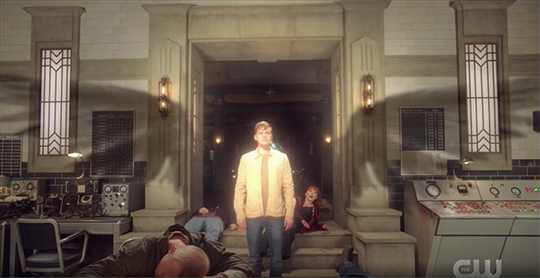
Jack is FINE.
Now:
In a deserted rest stop at a park, two teens are enjoying some alone time in the back seat of their car. The girlfriend, Barbara, hears a noise that doesn’t seem like it came from nature. The boyfriend, Thomas, shrugs her off at first but then agrees to go check out the noise. He’s confronted by his sheriff father just as he opens the door. AWKWARD.
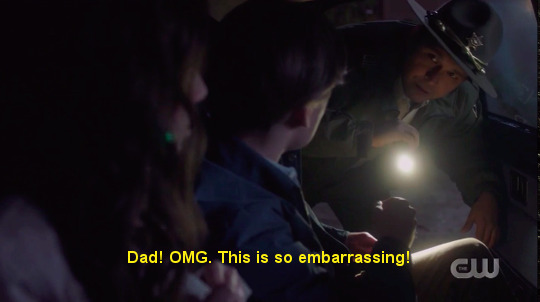
They fight about what he’s up to and Barbara heads to the bathrooms to give them some space. The bathroom is …the picture of perfection. She heads to the least disgusting stall. Once inside, she hears noises and sees a shadow in the room, and then a creepy monster hand curl itself around the top of the stall door.

Cue the screaming! Sheriff Dad rushes in to a now empty bathroom. He runs into the forest, briefly sees a Bigfoot-like creature in the shadows of the trees. Thomas cries out and the sheriff finds his son bereft over the dead body of Barbara. (Honestly, I thought we were only going to kill off white men for the rest of this show. This seems regressive.)
At the bunker, Sam is sitting alone in the dark kitchen. He’s clearly not doing well by pouring himself into finding another case to work. Dean wanders in and I enter a fugue state where I can’t remember what happens for the next couple of minutes. (I actually agree with this post 100%. Dean knows Sam’s state of mind. He’s always willing to fit that role that will help Sam feel better, more confident, and distract him with antics they both know aren’t real.)
Anyway, Sam has a case of missing people through the years in Iowa. Dean agrees, and Sam says he’ll grab Cas. Dean admits that Cas left earlier in the morning.

Dean also thinks that Jack should sit out hunting for now. He’s a bit of a wild card and it might be better to keep him close to home for a bit.
They find Jack in the library reading about zombies. Dean tasks him with restocking the bunker with beer and beer. (Um, I guess those driving lessons paid off. Now Jack can drive to the store alone and buy liquor he’s totally old enough to buy. Good parenting, Dean!)
Once in Iowa, at the sheriff’s station, the brothers are told the murder was actually a coyote attack, nothing more.
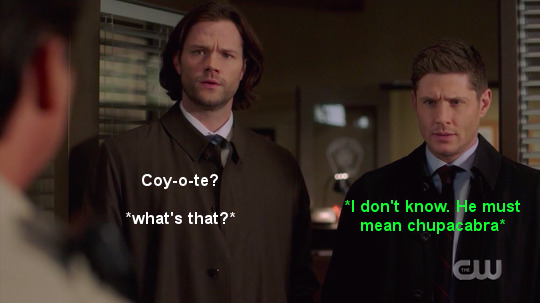
They still insist on viewing the body. They see the claw marks, and the burns around them, and know this isn’t a coyote attack.
Jack, meanwhile, is on his shopping excursion in Lebanon. It pains me how friggin’ cute he is. He’s awkwardly waiting for the store to reopen when Eliot, Max, and Stacy arrive. Eliot is garbed up in a cute brown and plaid jacket (such a hunter in training!) and watching videos of the Ghostfacers (what a blast from the past!) They notice “Bambi” just chillin and talk with him.

Eliot wants to know if Sam and Dean are ghost hunting, and Jack asks, “What’s a ghost?”, followed instantly with, “I have to go.” Boy, that line delivery was so perfect. In any event, Jack’s making friends, guys!
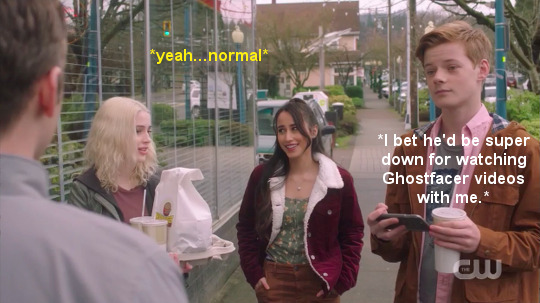
Jack and Eliot bond over reading about monsters. I just want to squish them, they’re so cute.
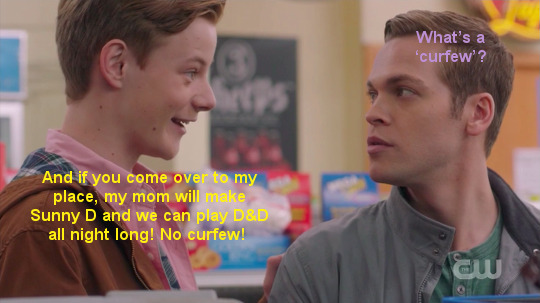
Also, how can Alex Calvert seem so young? Jesus, he does a good job playing baby Jack. We learn that the bunker has movie night every Tuesday, and that Dean really likes The Lost Boys. The kids learn that Jack is two, er, um, twenty-two. Whew, good save there, buddy! They still invite him to the abandoned house to hang out. Then they ask for ID to buy the beer (and I’m all like? Hello, you now have someone old enough to buy beer for you? What kind of narc kids are you?) Jack agrees to hang with his new friends.
At the sheriff’s office, Sam and Dean get free reign of the joint after hours (my how things have changed for them.) Sam thinks they’re dealing with a Kohonta, a local and ancient forest monster (in the great Northwest forests of Iowa —the X-Files often explored these forests as well.)
At the park a couple are hiking, in the dark.
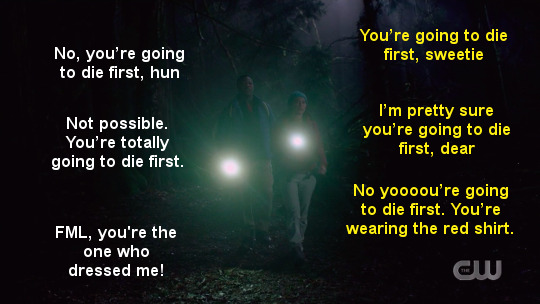
They hear a weird whistling, and then see a figure in the trees. They call out to him. It’s the forest monster! All twigs and stomach acid! (And once more not a dead white guy in sight. Sigh. —I don’t know what I’m focused on this this week?)
At the crime scene, Dean and Sam interview the other hiker. She gives them a location on where to look. The sheriff arrives and wants to shut down operations. Dean insists that because they’re the feds, they can still search the forest. He tells them they can’t, and the brothers are totally going to follow those orders.
Jack shows up at the house laden with books from the bunker’s library. Jack! Did you fill out a borrowing slip for those? Jack wanders the room with his signature awkwardness. In the space of minutes, he reveals that he likes Dean’s music, has never heard of the SATs, and that demons are made of smoke and totally real.
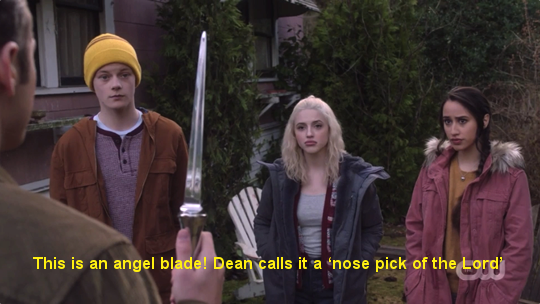
The Local Teens ™ are intrigued by Jack’s purported hunting prowess and, encouraged, he brings them outside to demonstrate an angel blade. It goes poorly at first… Poor Jack. It’s hard to impress older kids.
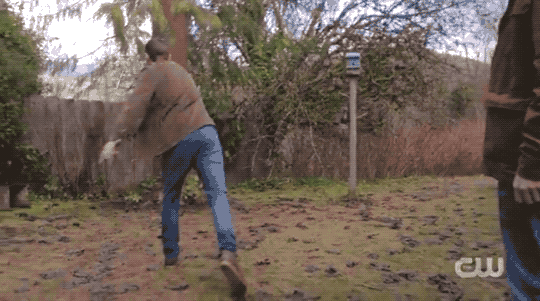
In the woods, Sam and Dean hunt the kohunta. As they’re stalking through the woods, the Sheriff sneaks up behind Dean with his shotgun and orders them to drop their weapons. Yikes, but also mad props to the Sheriff for sneaking up on Dean. He doesn’t get the drop on them for long, though.
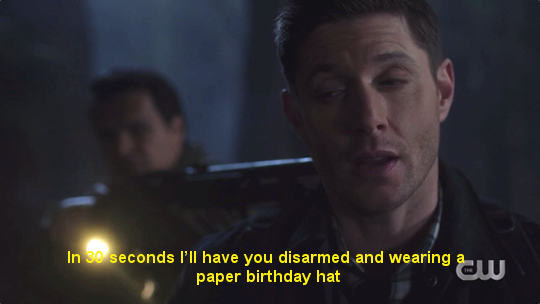
Cut to night… Jack’s apparently been trying to throw his blade all afternoon and the Local Teens ™ are bored. They goad Jack into defending his skills and he activates his newly restored nephilim power to finally hit the target. Hooray! Cool! Also, whatever.
Until…Jack uses his power to mind-mojo the blade back through the air and into his hand. Jack’s ecstatic about this, Eliot’s excited, and the two girls (who are clearly more sensible) are majorly weirded out. (Max is intrigued, at least.) Jack, encouraged by the sudden interest, levitates the blade in the air and then begins to swirl it around. It zips around in ever-increasing complex patterns. “I can control it,” Jack chirps while whipping the blade feet away from the teens, who are getting freaked out. Stacy tries to run and Jack’s blade cuts right into her, buried up to the hilt. Jack pulls out the blade and light glows from his hand as he tries to heal her. We’re left to wonder for just a moment if Jack failed…but Stacy sits up. She’s healed!
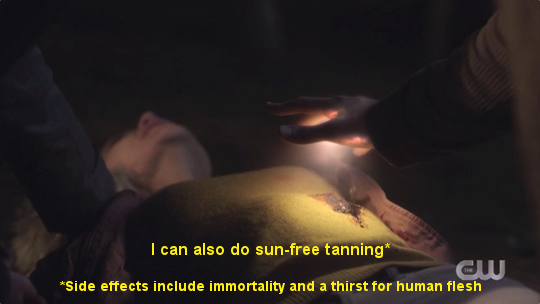
Jack moves towards them, encouraged by being able to heal Stacy and thinking he’s back in the teens’ good graces. They turn him away and Eliot orders Jack to stay away.
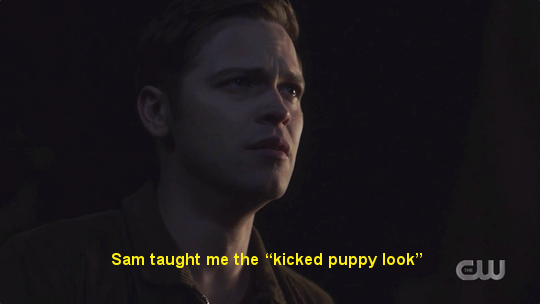
Dean and Sam talk to the Sheriff about the kohunta and we get a quick info dump on the MoTW. It’s an old tribal legend about the Parker family - some of the first white settlers in the area. One winter was particularly hard and the boy went crazy and ate the rest of the family. He developed a taste for people and started going after the people of the tribe. Instead of killing the crazed cannibal, they transformed him into the kohunta - a starving creature cursed to roam the woods and either eat people or slowly die of starvation. Legends being legends, this was forgotten and the woods they trapped him in were eventually invaded by interlopers a.k.a. tasty snacks.
Phew. Okay. Plot continues…. Sam and Dean totes kill monsters and they’re ready to help the Sheriff. The Sheriff asks them about going to YouTube to tell the world how to fight monsters but Sam’s against it.
The Sheriff’s son, Tom, interrupts their narrative wheel-spinning by calling and telling his father that he’s going after his girlfriend’s killer himself. The Winchesters and the Sheriff race to save him, silver blades at the ready (because it turns out that is what will kill them).
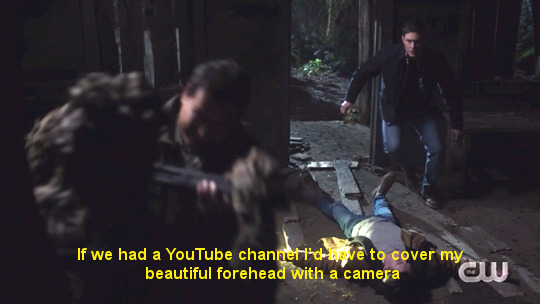
Tom reaches an old cabin, stalked by the monster, only to be attacked! It’s not looking good for Tom, who is about a second away from getting a giant acid lugey to the face. The Sheriff and Winchesters break in and they fight off the kohunta. One punchy kicky fight scene later and the monster gets a knife to the heart and dies. (Query: if this beast was around for long enough that the tribe forgot it existed, then how does cloth survive on its back? Magical curse blah blah, I guess.)
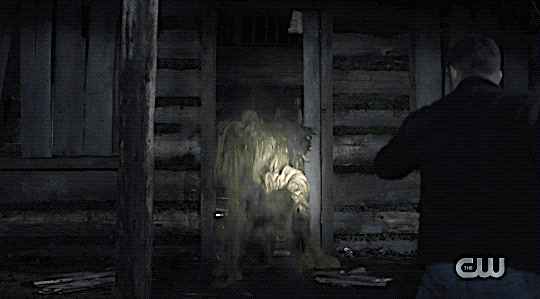
Tom’s alive. The Sheriff’s alive! Everybody wins. Sam and the Sheriff discuss the truth of the monster. Sam counsels him to tell the truth to his son; it’s the right thing to do.

Later, in the Impala of Feelings, Dean asks why Sam wanted to tell the truth. Lying’s the best way out of anything. Sam reminds him of lying to Jack…and all the times they lied to their dad about being “fine just to make him happy.”
Dean and Sam arrive back at the bunker. Jack got all the groceries except for the beer. (He only has fake IDs!) The Winchesters tell him they’re worried about Jack’s powers and they want him to not use them for a while. They’re telling him how they feel because they care. Feelings!
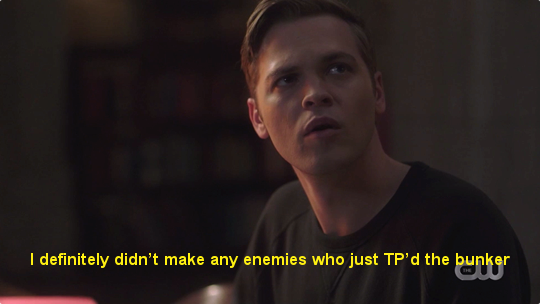
Jack mulls this over, and then fails to tell them about how terribly his powers just went wrong. Yeah. This is great. (Side note: he has learned one thing from Local Teens ™: subterfuge.)
Let’s Have a Quote Saber Fight!
Dean says that any music made after 1979 sucks ass
Well, there are standard hand to hand moves…like a light saber
Are you like a Jedi or something?
Whoa, that’s like full on Raiders!
Want to read more? Check out our Recap Archive!
#spn spoilers#spn recap#spn 14x16#don't go in the woods#dean winchester#sam winchester#jack kline#stacy and max and eliot#supernatural season 14
71 notes
·
View notes
Link
via Politics – FiveThirtyEight
The prevailing narrative of the 2020 Democratic presidential primary goes something like this: “Sen. Elizabeth Warren has kept gaining ground, and she’s now tied with former Vice President Joe Biden.” But the thing about narratives is that last month’s might not be true this month. (Never mind that last month’s might never have been true to begin with.) And while Warren is still doing pretty well overall — for one thing, her prospects in Iowa and New Hampshire look as good as or better than Biden’s — her standing in national polls looks like it has plateaued; it might even be a few points lower than it was a few weeks ago. She’s also pretty clearly trailing Biden.
First, let’s take a look at Warren’s movement in the polling averages over the past several weeks. We haven’t released an official FiveThirtyEight polling average of the primary yet (we’re working on it), but according to RealClearPolitics, as of the afternoon of Nov. 6, Warren was averaging 21.4 percent in national polls. That’s good for a solid second place, but it’s still comfortably behind Biden, who was at 28.6 percent. And it was a drop from Warren’s high of 26.8 percent, which came on Oct. 9.
The Economist is also out with a polling average of the primary this year, and while its average is a lot smoother (that is, less sensitive to individual polls) than RealClearPolitics’s version, it tells a similar story about Warren’s standing. As of Nov. 6, she was averaging 23 percent to Biden’s 25 percent, and the curve representing her polling average had turned slightly south after peaking in early October.
Another way to look at the primary is to group it into chunks organized around the four debates so far. It’s a bit rudimentary, but I calculated an average of pollster averages — I averaged each of the top five candidates’ level of support in polls from a single pollster and then averaged together those averages1 — for national polls in five roughly monthlong windows starting on June 1, which was about a month before the first debate.2 And my findings were the same: Warren steadily improved her polling average in each phase — reaching a high of 23 percent between the third and fourth debates — but has stagnated since the fourth debate. Her average for the most recent phase of the campaign is 20.7 percent, 7.5 points below Biden’s 28.2 percent.
(Most candidates’ polling averages have been quite steady, with the exception of Sen. Kamala Harris, who spiked after the first debate, in which she had a powerful moment attacking Biden on racial issues. Also noteworthy is that Biden has really not lost as much support as some media narratives would have us believe.)
We can also measure movement in the primary by looking at trend lines from individual pollsters — but again, they tell us largely the same thing: Warren’s support has leveled off and may even be ticking down.3 For example, Warren rose from 16 percent in Fox News’s mid-September poll to 22 percent in its early October poll, but she remained at 21 percent in its most recent survey, conducted just last week. And according to Investor Business Daily/TIPP polling, 17 percent of Democrats supported Warren in late July, 27 percent supported her in late September and 23 percent supported her last week. Quinnipiac offers the clearest trend, with Warren going from 14 percent after the first debate, to 21 percent after the second, to a high of 30 percent earlier this month, to 28 percent in the most recent survey.
As FiveThirtyEight editor-in-chief Nate Silver noted over the weekend, individual polls are also in near-universal agreement that Biden currently leads Warren nationally. Of the 23 polls conducted since the fourth debate, all but two found Biden ahead of Warren — one poll showed Warren slightly ahead and the other showed the pair tied. (Although in roughly half of the polls where Biden was ahead of Warren, his lead was within the margin of error.)
All this, of course, raises the question of why Warren’s ascent has been arrested. Given the timing, it’s fair to wonder whether the fourth debate had anything to do with it; after all, Warren did come under increased fire from Buttigieg, Biden and others, perhaps due to her perceived status as a front-runner in the race. At the very least, it certainly didn’t seem to help her as much as the third debate, which was followed by particularly big spikes for Warren in the RealClearPolitics average, my experimental average and several individual polls.
More broadly, criticism of Warren’s lack of a concrete health care plan may have finally gotten through to voters. Both at the debate and on the campaign trail, she evaded questions about how she would pay for her “Medicare for All” plan until her campaign, tacitly acknowledging the pressure, released a more detailed plan last week. On the other hand, maybe it has nothing to do with Warren at all and just reflects other candidates holding their own or picking up ground. For example, some of the polls and polling averages show Sen. Bernie Sanders and South Bend, Indiana, Mayor Pete Buttigieg ticking up a point or two in recent weeks; that support had to come from somewhere.
On the flip side, this could also just be a momentary blip for Warren. She has hit polling plateaus before (see her RealClearPolitics average in July) and they proved to be temporary. In particular, debates — with the exception of the fourth one — seem to lead to Warren upticks, and we’ve got plenty more of those ahead. So although Warren’s support has leveled off, it’s premature to say she has hit a “ceiling”; she may have plenty more support out there waiting in the wings.
1 note
·
View note
Text
Star Trek Episode 1.13: The Conscience of the King
AKA: The Devil Hath Power to Assume A Pleasing Shape: A Thesis
Our episode begins with a man being stabbed, which as dramatic openings go is certainly a bold one—though the reaction of the man being stabbed looks rather more like he just hit his funnybone than got knifed in the chest. The man doing the stabbing—a gray haired chap in nonspecific Fancy Old Clothes—puts a bit more effort into it, looking down at the blood now covering his hands with some amount of consternation.
Before the audience at home can start wondering if they accidentally tuned in to Masterpiece Theatre by mistake, we see Kirk, watching this from some comfy seating nearby, because it is, of course, actually a play. Macbeth, to be precise. The guy sitting next to Kirk tells him to watch Macbeth, presumably for a more serious reason than because Macbeth is the main character of the play so you’re kind of supposed to be paying attention to him.
Macbeth goes about his business, exiting through a nearby flat that I have to say looks like it was made for a middle school production, and monologuing to Lady Macbeth, as one does. In the audience, Kirk’s friend, still serious and intent on the scene before him, says that he knows that man’s voice. It’s the voice of Kodos...the Executioner. Judging by his tone I’m going to assume that he’s not just talking about another credit on the guy’s IMDb page.
After the titles, we see the Enterprise circling around a planet while Kirk gives a captain’s log, telling us that they diverted from their planned course to go check on one Dr. Thomas Leighton—Kirk’s friend at the play-- who claims he’s discovered a new synthetic food source that could end the threat of famine a nearby colony is dealing with. But we then immediately see that things are not quite as they seem. Down on the planet, Kirk is talking to Leighton, and he’s not happy. It seems that in fact, the real reason Leighton had the Enterprise diverted was so that he could tell Kirk about the actor that he thinks is this Kodos guy. In fact, he’s very sure Macbeth is Kodos, so sure that he lied to Kirk about the food discovery just to get him to come over there—which, as Kirk points out, has put both Leighton and Kirk in trouble. Kirk also points out this guy probably isn’t Kodos because Kodos is dead. Oh. Hm. Yeah, that does tend to complicate things.
Leighton thinks there’s still a chance Kodos is alive because the body that they found was too badly burned to be really sure. Kirk says this whole thing has been over and done with for years but Leighton wants to reopen the case. And quite a serious case it is, too—4,000 people dead. (It is, incidentally, some not half bad exposition; despite both characters effectively reiterating things they already know to one another, it comes off as pretty natural.) Kirk asks Martha, Leighton’s wife—well, I presume she’s his wife, and not just a random woman hanging out at his house—to talk some sense into him, but she says she can’t, he’s been in a snit about this ever since the actors showed up.
Kirk repeats that Kodos is dead and he’s satisfied with that, but Leighton says he’s not. He remembers too well what Kodos was like, what he did—and as he says this, he turns his head to the camera to reveal that his right eye and most of the right side of his face are covered in a black patch.

[ID: Leighton, a white man with short brown hair and one brown eye seen from the neck up and looking off to the side grimly. He has a black fabric covering over the right side of his face, extending into a patch that covers his eye.]
Leighton pleads with Kirk to help him. Less than ten people ever saw Kodos in person—somehow--and Kirk and Leighton are two of them. Leighton needs Kirk to help him expose this actor for who he really is. But Kirk insists that Kodos is dead. Which is not really surprising; what would you do if someone invited you to come see a play and then leaned over and said, “Hey, you see that actor there? I’m pretty sure he’s actually Hitler.” You could be forgiven for a certain degree of skepticism. But Kirk’s tone throughout this scene indicates that things run deeper than that. He has a history with Kodos. This is personal to him. He’s not just dismissing Leighton because his claim goes against something that is commonly known to be true; he needs to believe that Kodos is dead and gone, and is personally unwilling to entertain any idea otherwise.
Seeing that he doesn’t have Kirk’s support on this, Leighton dramatically announces that if Kodos is dead then there will be a ghost in his home tonight--he invited the actors over, because this whole thing is a puzzle, and dammit, Jim, a true gentleman leaves no puzzle unsolved! And seldom have the words “I invited them over for a cocktail party” been said so ominously. Kirk doesn’t much care, though, and heads back to the ship, grumbling about the trouble he’ll have entering this in his log—although compared to the kinds of things Kirk usually has to describe in his log, you’d think this one would be pretty easy.
But it seems Kirk is perhaps not so certain of things as he claimed, because we find him looking up Kodos in the library files, along with this suspicious actor, one Anton Karidian. The computer helpfully informs him, and us, that Kodos (I don’t know if that’s his first name or his last name or if he just went by one name, like Cher) was governor of a colony on the planet Tarsus 4, twenty years ago. The ‘executioner’ bit came in when he invoked martial law and killed half the colony, which does have a way of earning you a certain negative reputation. When backup from Earth arrived to sort things out, they found a body, but as previously mentioned it was too badly burned to be definitively identified, so it was just assumed that Kodos was really most sincerely dead.
Karidian, on the other hand, has been the director of this company of actors for the past nine years, traveling about as part of a galactic cultural exchange program. Also he has a nineteen year old daughter named Lenore. Man, this whole voice-operated computer thing sure is convenient. It’d be a lot harder to dramatically frame Kirk looking all this up on Wikipedia.
Before the computer can go into Karidian’s complete life history and theatrical appearances, Kirk interrupts and tells it to compare Karidian and Kodos. But the computer can’t, because there are no identification records on Karidian. Nor is there any information about Karidian before twenty years ago. It’s as if he just sprang up out of nowhere, right after Kodos died. Hmm. Leighton’s not sounding quite so paranoid anymore.
Kirk calls up side-by-side photos of Kodos and Karidian. They do look quite similar, albeit Karidian is a lot more gray in the hair. Suspicious—but just looking like a dude isn’t evidence that you are that dude. They could be distant relations or something.
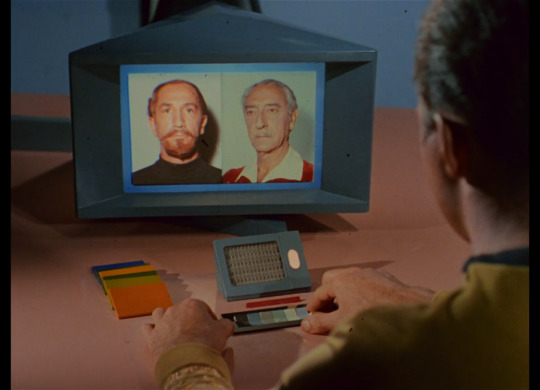
[ID: An over the shoulder shot of Kirk looking at a small computer screen on the table in front of him. The screen is showing two images side by side, one of a red-haired white man with a goatee, the other an older white man with gray hair and a mustache.]
There is, in case you were wondering, absolutely no information given about how Kirk was involved in this whole thing or what he was doing on Tarsus 4 in the first place. Originally I believe the episode was supposed to say he was stationed there as a young midshipman, which would make sense, but that got cut out, and the later information we get about Kirk’s age would make him thirteen at the time—and Starfleet might recruit young, but they don’t recruit that young. So the question of just how Kirk got from Iowa to Tarsus 4 is, like so many things, left up to the EU. And the question of what impact that traumatic event had on Kirk is left up to fanfiction, because lord knows the show will never revisit it again.
While Kirk is sitting there glumly staring at the pictures, Spock walks in on him, which is what happens when you use a random conference room to do your morbid internet searches instead of doing it in your room like a sensible person. Kirk asks Spock what he thinks of Leighton, if he’s the sort of man who’s prone to bouts of fantasy. Spock says that Leighton’s a good, reputable scientist, not presumably known for any tendencies to accuse random people of committing genocide. He also tells Kirk that they’re ready to leave orbit, but Kirk says to delay that for a little bit—he’s got a cocktail party to go to.
Down at the party Kirk is mixin’ and minglin’ with the actors, but Leighton himself is nowhere to be seen. Martha tells Kirk that Leighton went out to town, presumably to get more chips or something. In the meantime, everyone seems to be out on the patio, conveniently out of camera range, but as Kirk wanders into the house he encounters that most rare and stunning of creatures, a woman. Kirk immediately turns up the good ol’ Kirk charm and introduces himself, chatting with the lady about her performance. She says her father is the leader of the company, which would make her Lenore, the daughter of Karidian the computer mentioned. The nineteen year old daughter. Maybe, uhhh, turn down the flirting there a bit, Kirk?
Kirk says he was hoping to meet Karidian himself, but Lenore says that her father has a strict rule about never meeting anyone personally or attending parties. He’s the leader of a theatre company and he never meets anyone personally? That’s got to make networking a challenge. If Kirk can’t talk to Karidian himself, though, he might as well talk to Karidian’s daughter. He asks about their travel plans, compliments her on her performance as Lady Macbeth (personally I think it’s a mite weird for a nineteen year old to be playing Lady Macbeth opposite her dad as Macbeth, but stranger things happen in show business I guess), and says he’d like to see her again—not necessarily professionally. Lenore says she’d like that, but they must keep a schedule, to which Kirk points out that she doesn’t have a schedule right now, convincing her to go out for a walk with him. I’m just gonna sit here and pretend that Kirk isn’t chatting up a nineteen year old. It does help somewhat that she doesn’t look or act like a nineteen year old in any way.
So they go out for a stroll ‘n’ flirt, and Lenore comments on how Kirk is a bit different when he’s not around a lot of other people that he has to act all captainy for. Then she goes in for a kiss, but Kirk is distracted at the last second by the sight of a body crumpled against the rocks nearby. That’ll kill the mood, alright.
Kirk runs to investigate. It’s grim news—the body is Leighton, and he’s dead. And he didn’t bring any chips back.
Next thing we see, Leighton has been brought back to the house, where Martha mournfully lays a cloth over his face. Aw, dangit, guys, you’re not supposed to move the body until CSI gets there! We’ll never find out who killed him now. But it does seem that he was indeed killed, which raises the question of why someone would kill him if his suspicions about Karidian weren’t true. The obvious answer that maybe his suspicions were true hangs in the air, but all Kirk says is that he’ll try to find out what happened. He gives poor Martha a rather perfunctory hug before she exits, leaving him alone with Leighton.
After a moment, Kirk calls up to Uhura and asks her to put him through to John Daley, the captain of the Astral Queen—a ship that Lenore mentioned the company was planning to hitch a ride on. Turns out that Kirk and Daley are buddies and Daley owes Kirk some favors, which Kirk is about to cash in on. He asks Daley not to pick up the theatre company, saying the Enterprise will do it instead, and Daley is perfectly happy to abandon his passengers without any questions. Looks like Kirk’s up to something.
He goes back up to the ship, where Spock soon comes over to tell him that they’re ready to leave. But Kirk says to hang on for a minute, because they’re due for a pickup. Spock’s naturally a bit confused about this, but right on cue, Uhura says that Lenore’s just come aboard asking to talk to Kirk. Man, it sure is easy to get onto the Enterprise. All you have to do is invite yourself up.
Kirk tells Uhura to have Lenore come up to the bridge. Spock wants to know how in the heck Kirk knew Lenore was coming. Kirk is not helpful.

[ID: Kirk sitting in the captain’s chair on the bridge and saying, “I’m the captain,” while Spock stands behind the chair with a rather confused look on his face.]
Lenore enters the bridge, all dressed up in...uh...I have no idea what this is. Looks sort of like a bathmat wrapped around her torso.

[ID: Lenore, a smiling white woman with blonde hair half piled up and half hanging loose, walking through the doors of the turbolift to the bridge. She is carrying a pocketbook with a dappled pattern and wearing sparkly translucent tights and a furry gray dress-like thing with a boxy shape, which extends from partway down her arms to just below her hips.]
Lenore tells Kirk that, oh dear, it seems that their ride isn’t coming, and they don’t have time to wait for another ship if they’re to keep their schedule, so could they hitch a ride on the Enterprise, pretty please? Which is a touch strange because in my experience lead actresses are not the people who make the transport arrangements. But I suppose the episode would have gone rather differently if it was instead a beleaguered stage manager who called up to say, “Listen, who do I need to bribe to get us a ride on this ship because I have got a goddamn SCHEDULE to keep and I will fight off Klingons with a STICK if that's what it takes to get us there in time. You've got to have SOME room up there. You need us to stay in the cargo bay the entire time? Fine. Solid. I'll rig up hammocks. Whatever it takes. I am NOT KIDDING about this schedule.”
Kirk dithers, saying it’s against regulations to pick up actors. Well, actually, all he says is that “the regulations are very clear” which could just mean that they’re not supposed to pick up anyone, but I’m choosing to believe that Starfleet has a specific mandate against actors. Lenore says that she’ll make a bargain: if Kirk will be so kind as to give them a lift, the company will put on a special performance for the crew. Well, I mean, it’s against the rules, but who can turn down free theatre? Not Kirk, who says it’ll be something nice for the crew; they’ve been doing boring patrols for quite a while and are starting to get a bit stir crazy.
After a bit of banter, Lenore leaves. Kirk seems quite pleased with himself, but Spock is, understandably, wondering what the hell just happened. His confusion only increases when Kirk tells him to set a course for the Benecia Colony, which as Spock points out is eight light years off course. Kirk, suddenly a lot less jovial now that Lenore’s gone, snaps at Spock to follow his orders. Which Spock does, but not without the Eyebrow of Disapproval.
Kirk gives a log musing on the situation—how he has a lot of questions right now and he’s not entirely sure he wants them answered. Some time later, as they’re underway to the colony, he takes over Spock’s chair to consult with the library computer some more.
Specifically, Kirk is wanting some information about the eyewitnesses Leighton mentioned—the small number of people who actually saw Kodos. Which he says out loud, to the computer, which responds to him, out loud, while he’s on the bridge in front of everybody. Smooth going there, Kirk. Great job keeping this investigation of yours a secret.
Apparently there are only nine people who can identify Kodos, which strikes me as a bit odd considering the guy was the governor of a whole colony. One would presume he would be pretty recognizable to most of the people in that colony, unless he went full evil overlord from the beginning and holed up secretively in a castle or something. Not to mention the people who must have known him before he became governor. But no, there were just nine people—and one of them was Leighton, so there’s only eight people now. One of them is Kirk, a few more are names we don’t know, and then there’s one K. Riley.
That catches Kirk’s attention. Would that be Kevin Riley, who’s currently assigned to the Enterprise? Yes, it is—somehow, totally by accident, two of these nine people wound up serving on the same starship. It’s a small infinity out there. (Riley is referred to as being in the ‘Star Service,’ yet another proto-name for Starfleet.)
Kirk calls Spock over and tells him that he wants Riley to be transferred down to Engineering. Spock points out that Riley came up through Engineering—he’s now in Communications; I don’t know how the qualifications for those overlap but evidently they do—and without an explanation he’ll surely take this sudden transfer as a punishment for something. Kirk only says he doesn’t want to talk about it.
But Spock’s had enough of all this weird behavior. It’s time to get a second opinion, and that means talking to McCoy. Spock and McCoy might disagree on just about everything it is possible to disagree on, but there’s one area where they can always find common ground, and that is Dealing With Jim.
McCoy’s a bit reticent about this one, though, since he hasn’t been around to see Kirk’s recent odd behavior and also is a bit preoccupied with having a drink. Which leads to an odd bit of dialogue: “My father’s race was spared the dubious benefits of alcohol.” “Oh. Now I know why they were conquered.” There’s no other mention in the series of the Vulcans ever being conquered, so it’s anyone’s guess what McCoy is talking about.
Anyway, McCoy figures that Kirk probably just invited the actors up because he took a liking to Lenore, which admittedly would not be terribly out of character for Kirk. He’s also not impressed by the news that Kirk had Riley suddenly transferred, since after all he’s the captain and he can do that if he pleases. But then, I doubt McCoy keeps up with any of the various crew movements that don’t immediately concern the medical department, so Riley’s transfer probably doesn’t stand out as anything especially unusual to him.
Meanwhile, Kirk is taking Lenore for a stroll around the ship, stopping in the observation deck to look out at the stars—although for an observation deck, it has some really tiny windows. Lenore recites “star light, star bright” and when Kirk says the rhyme is very old she says it’s “almost as old as the stars themselves.” Right, I guess growing up with a traveling company of actors didn’t leave much time for science class.
They swap innuendos about how full of surging, throbbing power the Enterprise is (yes, really), and then Kirk tries to tease out some information about Karidian. But Lenore deflects, saying she wants to know about the women in Kirk’s world and if the Enterprise has changed them, “made them just people instead of women?” one of those lines which was so obviously written by a man that it might as well have been accompanied by A DUDE WROTE THIS in flashing letters on the screen. Kirk says that no, the women are still women. What a relief.
While all this nonsense is going on up on the observation deck, Spock is alone on the bridge, brooding. Yes, alone. Sure, it’s nighttime by the ship’s clock, but one would expect there to be a night crew. Maybe Spock chased them all off for better brooding conditions. He asks the library computer—which is really getting a workout in this episode—to call up the histories of Riley, Leighton, Karidian, and Kirk, and to check them all for similarities.
Evidently he finds something there, because next we see him talking to McCoy again—still at night, but hey, I don’t think either of them sleep, except when being drugged by salt monsters. Spock is explaining to McCoy exactly what happened on Tarsus 4, finally letting us in on the details of the situation. Apparently a fungus destroyed the colony’s food supply, leaving eight thousand colonists with barely any food. Kodos responded by declaring martial law, and began to separate the colonists, deciding who would live, rationing the remaining food—and who would be executed, to free up resources for the rest. Apparently he had some ideas about eugenics, and used them to determine who was fit to keep living for the benefit of the colony and who wasn’t. Yeah, uh, that’s...that’s not going to win you the politician of the year award.
The result was, as could be expected, brutal. Relief ships showed up, but not in time to prevent half the colony from being executed. As we’ve already heard, they found a body, but couldn’t determine for sure if it really was Kodos. And now this Karidian guy has shown up, and funnily enough, his personal history begins rather abruptly and immediately where Kodos’s left off. It rather strongly points to Karidian being Kodos, and also rather strongly points to him being really bad at making up a new identity. You gotta backdate some records, invent a bit of personal history, some fake relatives, man, c’mon.
So now Spock thinks that Kirk is suspecting Karidian is Kodos, a point on which Spock agrees with him. But things are worse even than that, because Spock has also discovered that that list of nine eyewitnesses isn’t just down to eight: it’s down to two. All of them but Kirk and Riley are dead, and not only that, but every time one of them died, the theatre company was somewhere nearby. Looks like there’s something rotten in the state of...whatever state we’re in. McCoy seems to agree, because he’s looking a good deal more serious now than he was earlier.
We don’t get to hear much of what McCoy has to say about the matter, though, because the next thing we see is Riley, sitting alone down in Engineering and looking supremely bored. And yes, if you’ve been wondering, this is in fact the same Riley that we saw back in The Naked Time, taking over Engineering and relentlessly singing at everybody—a rare case of a recurring character in TOS who wasn’t one of the main cast. In fact, this was entirely accidental; the character wasn’t written as Riley, but when Bruce Hyde was cast for the part they realized he’d already had a named appearance on the show and figured, what the heck, might as well make it the same guy--which is either a monumental coincidence or a really small casting pool.
Of course, that does mean that Riley mysteriously went from being a helmsman to being a communications officer who started out in Engineering. But hey, it’s the Enterprise, where people move around and show up in weird places all the time. Why do you think McCoy constantly reminds everyone that he’s a doctor? He’s probably afraid that if he doesn’t repeat it enough he’ll wake up as a botanist one day with no explanation.
At any rate, Riley’s pulling the night shift down in Engineering, and given his history, one has to wonder if the poor guy is taking this unexplained demotion as an overdue punishment for the Incident, or perhaps even, considering where he was reassigned, as a cruel joke. One thing’s for sure, he certainly doesn’t look very happy. He’s also still wearing a gold shirt, even though both Communications and Engineering are Operations, which is red, so I don’t know what that’s about.
Riley is so bored, in fact, that he calls up to the rec room just to have somebody to talk to. He laments his current position to the few people hanging out up there, who also assume that he’s been reassigned as punishment, though Riley protests that he has no idea what he did. But luckily for him Uhura is hanging out in the rec room playing her lyre, and she agrees to play him a love song to take his mind off how dark and empty and lonely Engineering is.
Unfortunately, while the music of Uhura distracts Riley from his predicament, it also distracts him from some other things—like the fact that someone else has crept into Engineering, with nefarious plans for the delicious dinner of fruity space cubes and milk that Riley has set aside. Although evidently the props department phoned it in on this one, because the villainous stranger is carrying that classic TOS prop, the Completely Unaltered Modern Spray Bottle, and as a result it looks rather like their plan is to poison Riley by putting Windex in his milk.
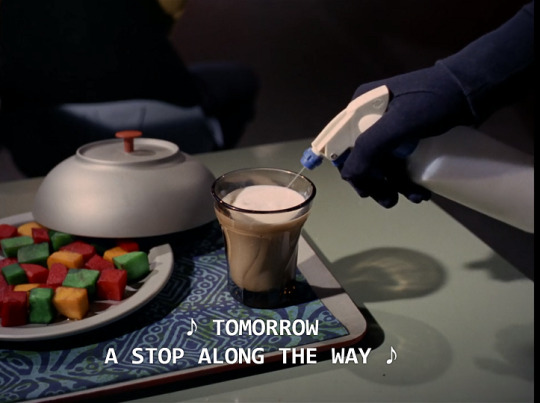
[ID: A tray showing a partly covered dish of red, yellow and green cubes, and a glass of milk. A gloved hand is reaching in to spray something into the milk from a clear spray bottle. From offscreen, Uhura is singing, “Tomorrow, a stop along the way...” ]
I mean, I guess that would do the trick.
Shortly thereafter, Riley remembers that he does in fact have food waiting, and decides to whet his thirst with some delicious milk while listening to Uhura. It’s a lucky thing for Riley that he did decide to do that when he did, and that Windex is such a short-acting poison, because the comm link is still open to the rec room when he starts gagging and choking and spluttering for help. Then he falls out of his chair, spilling milk all over the console in the process. Man, Riley just can’t help but make a mess of Engineering, huh.
Help soon arrives, presumably, because the next thing we see is Riley unconscious in Sickbay, while Spock and McCoy look on seriously. Spock says that McCoy has to save Riley because if he dies, Kirk will be the only witness left and he’ll be targeted next. And also because Riley is a person and his life is valuable, or something, presumably, I guess. Of course it looks like whoever’s doing this is trying to take out all the witnesses, so unless they’re just really determined to do things in a specific order, Kirk’s going to be the next target regardless of whether Riley makes it or not.
But as Kirk’s log soon tells us, Riley’s condition is not looking good, and McCoy is struggling to find an antidote for Windex poisoning. Since the substance is in use aboard the ship—all those giant windows, y’know—McCoy tells Spock that it’s possible someone just made a mistake and poisoned Riley’s milk by accident. As you do. But of course neither of them really believe that, and Spock wants Kirk to be notified immediately, not even letting McCoy finish his report first.
So the two in blue go off to confront Kirk in his quarters, where he’s brooding over some paperwork. Spock tells Kirk that they know about the whole Kodos thing. Kirk is feeling tetchy, though, as a murder threat is wont to make you do, and accuses Spock of prying into Kirk’s personal business and generally being out of line, which quickly turns into a shouting match. But while Kirk may be able to fend off Spock or McCoy individually, both of them working together is too much for him. Too much for any mere mortal, really.
Kirk backs down just a bit and points out that they don’t have any proof of anything, but Spock tells him to cut that bullshit out (but, y’know, in a more Spock-like manner). He wants to know why Kirk is risking his life, knowing that he’s surely going to be the next target. Kirk says that he’s interested in justice, but McCoy asks if he’s sure it’s not vengeance, and Kirk admits that he’s not.
He goes on to talk about how he cannot be certain Karidian really is Kodos, and that he must be certain before he can accuse anyone of something like that. After all he only saw Kodos once, twenty years ago, and human memory becomes distorted over much shorter periods than that. Kirk does not want to rely only on logic for this: he won’t be satisfied until he knows in his heart that Karidian is Kodos.
And if he is certain, what then? McCoy asks. Nothing done to Kodos now will bring back the people he killed. No, Kirk agrees, but…

[ID: Kirk looking seriously into the distance and saying, “But they may rest easier.”]
It’s quite the scene. Kirk is obviously struggling with this dilemma, and with his own memories of that terrible event. He knows there’s a weight on his shoulders to do something, but that weight only makes him more determined to be certain before he acts—while also making him all the more uncertain. William Shatner primarily gets remembered for all the hammy shouting he did as Kirk, but he was fully capable of pulling off the quieter scenes as well, when he had something to work with.
After the break, either the conversation is still ongoing, or Spock left and came back just to repeat what he already said, I’m not sure. At any rate, McCoy’s gone off somewhere and Spock and Kirk are still hashing it out when Spock hears an ominous humming noise. They both immediately recognize it: it’s a phaser on overload, getting ready to blow, and that’s seriously bad news.
Spock starts tearing about the room while Kirk puts out a call to evacuate the deck, because if that phaser goes off it’ll take out the whole thing. Then he pushes Spock out the door to go lead the evacuation while he keeps looking for the phaser. The hum is getting louder and louder as Kirk throws books around desperately, until finally he spots it—it’s in a tiny alcove in the wall, behind a transparent frame. What possible use that alcove could have besides hiding phaser bombs in is a mystery to me.
Kirk grabs the thing out, and evidently it’s too late to turn it off now, because after a moment of grappling with it he runs out of the room and chucks the phaser in a convenient nearby chute, labeled ‘Pressure Vent Disposal.’ Spock comes running back in time to stand there and wait for a tense few seconds before there’s an explosion somewhere far below, still strong enough to knock them both against the far wall. Crisis averted—just. Man, good thing that chute was there.
Elsewhere on the ship, Karidian is hanging out in his temporary quarters, wearing quite the elaborate high-collared robe, as actors do when they’re relaxing. But the tense music tells us that this is not any ordinary hanging out, it’s very ominous hanging out. Kirk soon comes in, determined to have a talk. He’s in quite the mood after that little incident with the phaser, understandably—Kirk’s not much bothered by a threat to his own life, but a threat to his ship and crew? That will sure spur him to action. He’s not here to beat about the bush, either, just straight-up asks, “Are you Kodos?” Blunt. I like it.
Karidian reacts very little to this, which in itself is telling, because if you’re not an infamous mass-murdering eugenicist, then one would expect that your reaction to someone walking into your room and accusing you of being one would be surprise. And confusion. Just a general sort of, “What? No. What the fuck, no?”
But Karidian only asks if Kirk believes that he is Kodos, and when told that he does, says that he’ll be Kodos if it pleases Kirk to believe that. Because he’s an actor, and plays many parts. My dude, that’s not how acting works. You don’t have to just pretend to be anybody that someone accuses you of being. Hell, there’s probably a union rule about that somewhere.
Unsurprisingly this non-answer doesn’t much amuse Kirk, nor is he amused when he asks what Karidian was twenty years ago and Karidian just says, “Younger. Much younger.” So he gives Karidian a piece of paper and tells him to read it into the wall comm, so they can compare it to a recording of Kodos that they have on file, which Kirk says is a “virtually infallible” test.
This is a part of the episode that didn’t hold up so well over time. We’re repeatedly told that Kodos was never positively declared dead because the body was too burned to be identified. That made sense in 1966—or at least, I’ll give them the benefit of the doubt that it did—but we’ve gotten a lot better at forensics since then, so it’s a bit hard to find that believable. What, no DNA test? No dental records? Facial reconstruction? Nuthin? The whole computer voice comparison thing is obviously supposed to come off as cool future tech but in a modern context it just seems rather silly.
I’m not real inclined to hold this one against them as an actual criticism, though, since it’s not like the writers could possibly have known otherwise at the time. That said, even putting aside the modern context, the crux of this whole ‘only nine witnesses’ thing doesn’t really hold up too well within the episode. I already mentioned how weird it is that apparently there are only nine people, out of the four thousand or so surviving colonists, that could identity the governor of the colony, but even allowing that one it still doesn’t make any sense because there are photos of Kodos. We saw Kirk looking at one back near the beginning of the episode! If there’s photographic proof of what the dude looks like, why the heck are these eyewitnesses so important? It’s not as if they can’t prove he did the crime unless they have people who can say they saw him doing it—that’s not the kind of crime you can cover up, and anyway, no one ever expresses the slightest bit of doubt that it was Kodos himself who did it. Everyone knows that. The question is what he looks like, and that’s not a mystery. Eliminating the eyewitnesses would do nothing because someone could still figure out who the guy was by looking at a picture of him! That you have! In public access library files!
The weird thing is that plot-wise there was never any need to show that photo at all. It just came up and Kirk went “hm” at it and that was it. They could easily have just not shown that there were any photos of Kodos, and then we wouldn’t have this problem, but they did, and here we are.
Anyway, Kirk gives Karidian the paper, and tells him to read it out. What, without even a lawyer present? You can just walk into someone’s room and make them take a possibly self-incriminating identity test? Man, space law is tough.
Karidian doesn’t look happy about this—unsurprisingly--but he’s not got much choice, so he takes the paper and begins to read from what is evidently a speech that Kodos gave. “The revolution is successful, but survival depends on drastic measures. Your continued existence represents a threat to the well-being of society. Your lives mean slow death to the more valued members of the colony. Therefore I have no alternative but to sentence you to death. Your execution is so ordered, signed Kodos, governor of Tarsus 4.”
As he reads, he slowly looks away from the paper and stares into the distance, clearly no longer reading the words but remembering them, and the look on his face says that it is a sharp memory and a haunted one.
Kirk does not fail to notice this, and points it out to Karidian, who deflects by saying that he just learns lines very quickly. Kirk’s not buying that, and asks whether he didn’t instead “play the part in front of a captive audience, who you blasted out of existence without mercy.” At that, Karidian starts going into a spiel about how Kirk is just an example of a modern technology-driven society that lacks humanity, which he defines as being about striving to survive with our own resources. Which is an odd definition of humanity, but okay. He insists that Kodos only made a decision that had to be made, that those four thousand people had to die so the other half could live, and if the supply ships hadn’t turned up early, his actions might now be remembered as heroic. I dunno about that, man, it’s pretty hard to get people onboard with killing four thousand innocent people. Unless you convince them that they’re terrorists first.
Seeing that Kirk is not impressed with this argument, Karidian asks (loudly) why Kirk doesn’t just kill him now, if he’s so sure that Karidian is Kodos. Just execute him on the spot, eh? That sounds like something Kodos the Executioner would suggest! Got him!
But while Kirk might not be hewing real close to due process at the moment he hasn’t gone that far, so instead he presses Karidian on how there are no records of him prior to the date of Kodos’s supposed death. Karidian doesn’t really dispute this, choosing instead of muse about how he’s grown old and tired, memory failing him and grateful for it, and doesn’t really care about being alive anymore. Out, out, brief candle, and all that.
Then he asks Kirk if he got everything he wanted, and Kirk quietly says that if he had gotten everything he wanted, Karidian might not leave the room alive.
With that, Kirk turns to go, but before he can leave, Lenore emerges unexpectedly from a side door and ushers Karidian to go rest. Then she tells Kirk that “there’s a stain of cruelty on [his] shining armor” and accuses him of only using her as a tool to get to her father. Which, well, that is what he did. Kirk insists that it started out that way but that he wound up wanting a more genuine relationship, which is not really great consolation.
Lenore says that Kirk has no mercy in him, to which Kirk responds that if Karidian is Kodos, Kirk has shown him more mercy than he deserves. And if he isn’t Karidian, Lenore asks? Then the players will be let off at their destination and no harm done. Lenore protests that Kirk has no right to decide whether harm was done, and maybe that’s true—but her case is looking rather thin at the moment, because like with Karidian himself, her lack of reaction to her father being accused of being Kodos leaves little room for doubt. She makes no attempt to dispute Kirk’s claim, let alone respond to it with the kind of anger, shock and confusion that would be expected. I mean, let me put it this way: if I heard someone accusing my dad of being a mass murderer I would not be like “you have no mercy in you! you could have spared him this!” I would be like “WHAT the FUCK are you TALKING about.”
Elsewhere, away from all this high drama, McCoy is in Sickbay making a medical log about Riley. Apparently Riley’s recovered, but Kirk wants him restricted to Sickbay for the time being so he doesn’t have any encounters with Karidian, who, as McCoy helpfully adds, might be the guy who murdered Riley’s family. Unfortunately, Riley is right in the next room and overhears all of this. Whoops. I mean, on the one hand, this is what happens when you don’t have keyboards, but on the other hand, ya probably could have been just a wee bit more careful there, Bones.
Kirk gives a log telling us that Karidian is under surveillance, and that “strategic areas” are on double guard, but that the scheduled performance is still going ahead. Which seems a bit odd, but then I guess at least if the guy’s onstage you know he’s not off somewhere murdering somebody. Or some four thousand bodies. Evidently the Enterprise doesn’t have an auditorium that can seat four hundred people, though, because only a few people get to actually watch it in person—everyone else has to watch it being broadcast on a screen.
Lenore comes out on stage to inform the audience that they’re performing Hamlet, and also, please make sure you turn your communicators off during the show. She calls it a “violent play written in violent times when life was cheap and ambition was God.” Man, if I wrote that in a paper my Script Analysis professor would have laughed me out of the room.
Meanwhile, Kirk and Spock are examining the results of Karidian’s voice test. Is this virtually infallible computer test actually being done by the computer? No, it just printed out a couple of pieces of paper with soundwave patterns on them for Kirk and Spock to look at. Technology, ain’t it wonderful. Spock says it looks like a match, but Kirk says it’s not an exact match. Well, no, it wouldn’t be, the guy was twenty years older the second time. But Kirk says they’re dealing with a man’s life and no machine can make that decision. WELL THEN WHY DID YOU MAKE HIM TAKE THE TEST.
Over in Sickbay, McCoy is about to go to the play and stops in to remind Riley of something—to stay put, presumably—only to discover that Riley has vanished. Poor McCoy, he just can’t make anyone stay in Sickbay. They really need to put a door with a lock on that place.
McCoy immediately calls up Kirk and tells him that Riley’s gone, and that he might have overheard McCoy talking about Kodos. Right after that, security calls Kirk to tell him that someone broke into a weapons locker and took a phaser. Great job, security. Kirk puts out an alert for security to find Riley and keep him from murdering anyone, which I’m sure they’ll do quickly and competently.
Kirk slips backstage while Hamlet is having his encounter with the ghost of his father, as played by Karidian. Y’know, when I was in college, a group of traveling actors came and did a performance of Othello at our theatre, and their set design was just a white cloth running around the stage and a few chairs at the back. It worked incredibly well and the production was phenomenal. I’m just saying, just because you have a low budget and have to pack all your equipment around with you doesn’t mean your plays have to look like this.
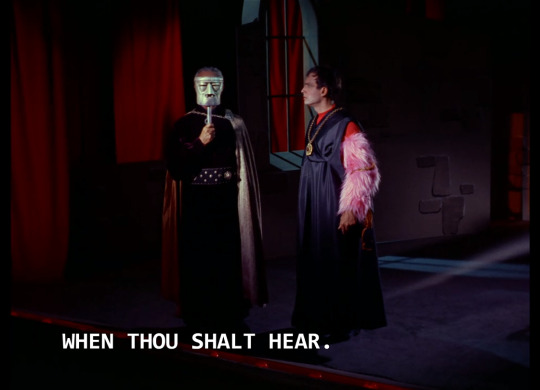
[ID: A stage set with a cheap-looking ‘stone’ wall to the left, with windows facing into the red curtains. On the stage are Karidian, wearing a black belted robe with a silver cape slung off his right shoulder and holding an abstract metal mask in front of his face, and a man wearing a blue robe, bright red undershirt, enormous gold medallion, and what looks like a pink feather boa wrapped around one arm. Karidian is saying, “...when thou shalt hear.” ]
Backstage, Kirk spots Riley, sneaking up behind a flat with a phaser at the ready. Man, only five scenes in and already things are derailing pretty badly backstage. Could be worse though. At least nothing's on fire. Kirk tries to tell Riley to calm down and not kill someone on a suspicion, but Riley—despite presumably being a lot younger than Kirk when he saw Kodos—has none of Kirk’s hesitation about the issue. He remembers what Kodos looked and sounded like and he’s dead certain that Karidian is him.
Evidently he’s not all that ready to take justice into his own hands, though, because once Kirk gets over to him—crossing right in clear view of the audience, dammit Kirk! If you can see the audience they can see you!--he’s able to easily take the phaser away, and Riley leaves with little fuss.
Karidian takes his exit, and Lenore is waiting to tell him that he’s doing a great job, but Karidian is quite agitated. He tells Lenore that he’s being tormented by a voice from the past; there was “another part he played, long ago” and “now that same curtain rises again” because as we all know actors speak entirely in theatrical metaphors. But Lenore says no—after the performance, the last two people left who can harm him will be taken care of. Oh.
Judging by Karidian’s reaction, Lenore did not keep him in the loop about her witness-murdering activities. He grabs her and starts yelling, demanding to know what she’s done.
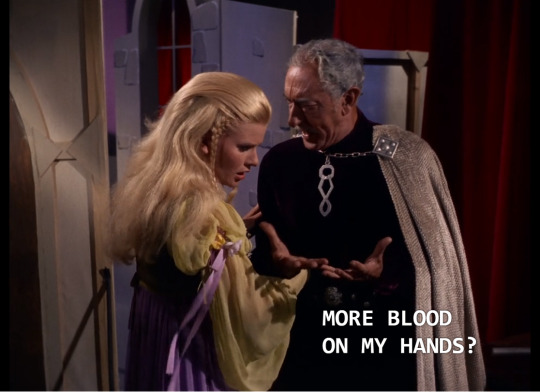
[ID: Karidian standing backstage behind some castle set pieces, holding up his hands and yelling, “More blood on my hands?” at Lenore, who is wearing a pink and yellow dress, and looking away with dismay.]
Dammit, Lenore! I just got the last damn spot out!
Lenore insists that it had to be done. She’s buried the ghosts of the past, and now there is no more blood on her father’s hands. That’s an interesting concept of justice you have there, Lenore. Karidian is distraught, and exclaims that Lenore was the only thing in his life not tainted by his crimes. Now he has nothing.
For some reason no one reacts to this rather loud confrontation taking place just offstage, which is also mysteriously bereft of, say, actors. You'd expect someone to have a reaction to this. Probably the stage manager. “GODDAMMIT I told you to stop talking backstage. The audience is going to hear you. They're going to SEE you if you don't quit hanging around blocking traffic back there. That is NOT THE PLACE to have a nervous breakdown. Lenore I don't care if you're having a dramatic revelation about your murderous role in covering up your father's past misdeeds, if you miss your cue I WILL SHOOT YOU MYSELF.”
Lenore is still grinning unnervingly and talking about how everything’s fine now, she’s taken care of everything, now no one can harm her wonderful, brilliant daddy. Kirk, who’s been listening in the whole time, has had enough, and tells them both to come with him. Lenore says they will after the show, but Kirk tells her the whole ‘the show must go on’ thing doesn’t apply to murder investigations.
She doesn’t take that one too well, and when Kirk summons a security guard (from...somewhere) she grabs the guard’s phaser and runs out onto the stage, sending the audience diving to the floor in panic. Kirk, Karidian, and the extremely useless security guard come after her, but stop as she turns the phaser on them. When Kirk tells her she’ll never make it off the ship, Lenore, who is clearly no longer on speaking terms with normal reality, says that then the ship will just go on drifting through space with Karidian’s ghost giving performances forever. Then she starts quoting Shakespeare, which is never a good sign.
Kirk tries to get close to her, but Lenore moves to fire—and Karidian dives in front of him. The phaser bolt hits him square in the chest and he goes down as Lenore screams in anguish. As Kirk steps forward to take the phaser away she collapses to the floor, kneeling over her father’s body, sobbing and feverishly babbling more Shakespeare at him while the audience stares in confused horror.
Well that brought the play to a rather abrupt halt, and so early on too. Still, I'm sure they could salvage it with a concerted effort. “Shit. Shit, did one of the actors just murder another one of the actors? Okay, no one panic, I've seen worse. Just keep going. Act like it was meant to happen. The audience won't know the difference if we play it cool. It's Hamlet, everyone dies anyway.”
Sometime later, McCoy comes to visit Kirk on the bridge to give him Lenore’s medical report. Apparently she remembers nothing and thinks Karidian’s still alive. McCoy says she’ll receive the best of care, which I hear has really improved in the Federation since they got rid of the brain-melty chair. He asks Kirk, “You really cared for her, didn’t you?” Kirk dodges the question, giving orders to leave orbit instead—but he gives McCoy a look which the doctor takes as an answer before he leaves the bridge, and the ship carries on through space.
It’s a weird way to wrap up the episode, if you ask me. This was a story about Kirk having to revisit a horrible event in his past, and struggle with questions of justice and revenge and what he has the right to do, and what the fallout of his suspicions could be for an innocent man if he is wrong, and if redemption is ever even possible for some crimes. I don’t expect them to wrap all that up in the last minute and a half, but it’s jarring to me that they went, “You know what we really need to focus on here out of all of that is the romance angle.” Perhaps I am biased, but why that should be considered inherently more interesting than everything else going on here is beyond me. Not to say that Kirk’s feelings about Lenore are not complicated and painful and probably quite worth examining, but there’s no question asked about how he feels about Kodos, a horrible figure from Kirk’s past risen again to haunt him, only to prove more complex than was thought, who then dies in a way that could offer no real catharsis for anyone.
I suppose you could say that McCoy was just way off the mark about how Kirk was feeling and didn’t ask the right question. But I’d like to think that McCoy--who has a medically educated understanding of the complexities of trauma, who has very strong feelings about the taking of life in any circumstance, and who has been through a scarring experience or two himself--would know better. Still, on the whole, it was a fine outing for TOS, giving us some interesting characters, great little character bits with our mains, and tackling some serious questions, even if the acting allegories got a little bit overwrought.
TREK TROPE TALLY: None once again. Next time, we’ll be getting our first look at some classic enemies in Balance of Terror.
#star trek#star trek TOS#star trek TOS season one#1.13 The Conscience of the King#recap tag#star trek TOS recaps#1.13 The Conscience of the King recap
37 notes
·
View notes
Photo
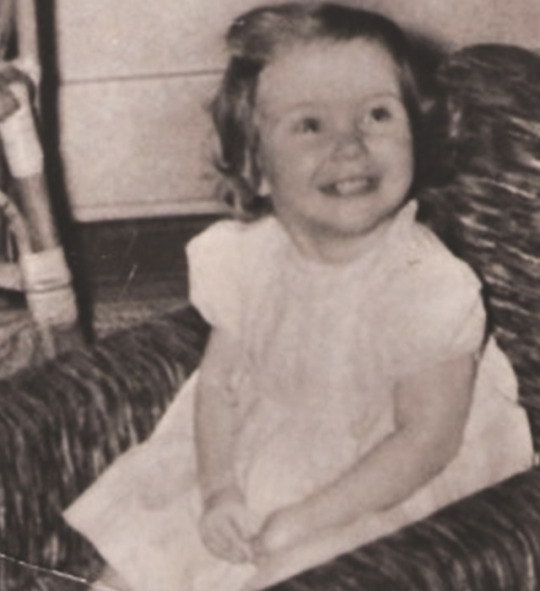
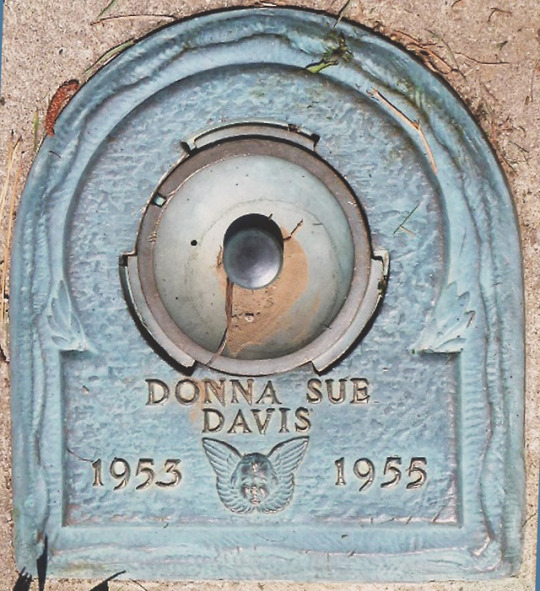
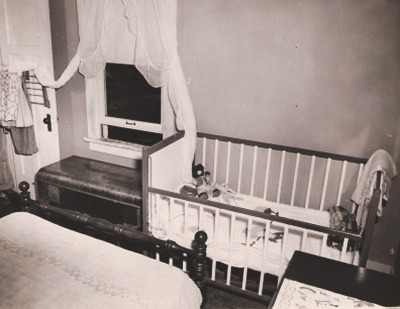
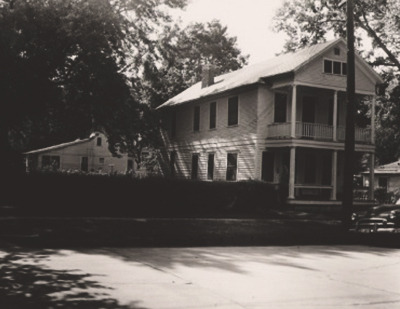

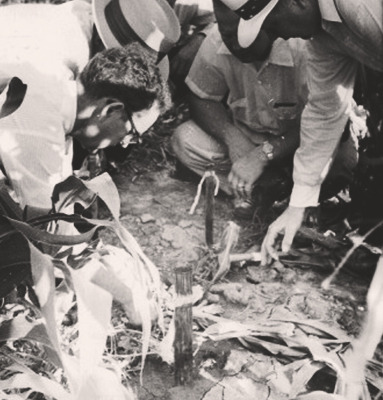
Donna Sue Davis was considered “the darling of the neighborhood”. That, in fact, is what everyone called her. The happy baby was adored by those living in Sioux City, Iowa and was especially beloved to her family. It was hard not to love Donna Sue. With her blonde curly lochs and sparkling blue eyes, she looked every bit of a living Kader baby doll. At twenty-one months, Donna Sue was the youngest of James and Mary Davis’ three children. They lived together on the first floor a neat, white duplex on Isabella Street. It was considered the ideal place to raise a family. Carefree children would run up and down the streets under their mothers’ watchful eyes. Summertime had always been considered a favorite season due to its jovial nature, but the summer of 1955 would change the neighborhood forever.
On the night of July 10th, 1955 Mary Davis tucked Donna Sue into bed. She placed some favorite toys - a teddy bear, a doll, and a red purse - inside the crib just in case the baby woke and needed comfort. Donna Sue was never far from her mother, though, as the crib was set at foot of her parents’ bed. After kissing her daughter goodnight, Mary opened the bedroom window in hopes of catching a breeze amidst the sweltering temperatures. Then, she goes to the living room to sit with her husband while she reads the paper.
Just after 9:30 PM George Berger, the Davis’ neighbor, notices a man cut through the hedges at the Davis house. It was dark, and too difficult to see exactly what the man was doing, but he seemed to be walking along the South side of the house. For a few short minutes the man disappears. Berger is about to brush off the incident when the man reappears. He walks across the yard in a hunched over position, now carrying a bundle in his hands. Berger is not the only neighbor to see him. Mr. and Mrs. Fjeldos, the couple living behind the Davis family, is alerted by the loud barking of their dog. Mrs. Fjeldos turns on their back yard light to see what all of the ruckus is about. The light reveals a strange man creeping down their alley way. Quickly, she alerts her husband, who goes after the man with a flashlight. The stranger tries to hide behind some bushes, but does not manage to escape. Mr. Fjeldos passes the flashlight off to his wife while he runs back inside to alert the police. Before the police can arrive, the man jolts through the alley, with Mr. Fjeldos right on his heels, and runs a block before he once again disappears into some bushes. He is never seen again.
A worn out Fjeldos returned to his home. He was standing outside, still waiting for the police to arrive, when a crowd of curious neighbors began to gather. Fjeldos was in the middle of telling them what had just happened when he was interrupted by a shrill scream. “My baby is gone!”
At 9:40 PM Mary Davis returned to her bedroom to check on Donna Sue. All she found was an empty crib. She and James search through the room just in case Donna Sue managed to climb out, but the baby was nowhere to be seen. What they did discover was the screen to the bedroom window was completely removed. James bolted downstairs to report the kidnapping.
Several other neighbors reported seeing a white male skulking around the neighborhood that night, but none were able to give a clear description of the suspect. He was believed to be in his 30’s, of average height, and wearing a white shirt with khacki pants. A man fitting this description was was seen by a Sioux citizen as he was driving near a motel. He passes a man in a white shirt and khaki pants standing by a black Charlovet van beside the road. In his arms was a baby. The scene was rather unusually considering it was past 10 PM, but the man drove on without giving it a second thought. He was not aware of the significance of that moment until he learned about the kidnapping. He was, however, able to remember the car had a Nebraska license plate.
A massive search carried out all of Sioux City. Everyone was desperate to help. Despite the tireless work of the police officers and many volunteers, little Donna Sue was not returned home. That afternoon a farmer by the name of Ernest Oehlerking was heading to Sioux City when a bright pink garment lying in the ditch caught his eye. Oehlerking stopped his tractor and got out to investigate. It was a pair of small pajama bottoms with a pair of rubber pants. Immediately, Oehlerking cancels his trip and hurries back home to alert the authorities. It would be his wife that would find Donna Sue. During the late afternoon of July 11th, 1955 Ernest’s wife, Genevieve, set out with Florence, her sister-in-law, set in their cars to search the area of William Oehlerking’s farm. With their daughters in tow, the drove along the road while keeping a sharp eye for another possible clue to the baby’s disappearance. The temperature that day blazed up to 96 degrees, but the women were determined to help a fellow mother, who was braving a nightmare miles away.
The quiet concentration is broken when one of the girls screams. Through sobs, she frantically tells the other passengers that she saw the baby’s body on the edge of a cornfield. They pull over to investigate. The girl was right; there, lying amongst broken corn stalks, was Donna Sue’s battered body. It takes only a glance for the Oehlerkings to know little Donna Sue had not died peacefully. Her body and face was littered with bruises, many of which are centered near her eyes. The pink pajama top that her mother had put on just the night before was wound tightly around her neck. The autopsy report would later reveal more grim and horrific details. In addition to the beating, the one-year-old suffered from a broken jaw. There were multiple cigarette burns on her buttocks, and she had been raped. The final cause of death was ruled as blunt force trauma. Investigators believed that the murderer threw Donna Sue out of his car as he drove away. The impact from the body broke several cornstalks. By the time she was found, Donna Sue had been dead nearly twelve hours when she was found.
Quickly, Genevieve and the children drove home to call the police. Florence remained in the cornfield, waiting, beside Donna Sue. She tore up a paper sack that she found nearby, and used it to cover up the baby in attempt to salvage her some dignity.
Once the case became a homicide the FBI became involved. Six federal agents were brought into investigate. J. Edgar Hoover, the FBI director at that time, made a public comment that, although simple, perfectly summarized the feelings of those in Sioux City. “Get him!”
Days after Donna Sue’s body being recovered, investigators interviewed several men that fit the description of the man who was seen prowling around the Davis’ neighborhood. One of these men were Otto Wennekamp, a thirty-year-old, who sometimes worked as a farm hand. He was taken in for questioning on July 13th after he attempted to trade in his car for a rental. An employee at the car rental business noticed that there were cigarette burns on the dashboard of Wennekamp’s car, and promptly contacted the police. Wennekamp was interviewed by FBI agents, but was ruled out as a suspect by his air tight alibi.
Because the case had become incredibly well known to the public, investigators received an overflow of tips. There were also confessions. A drifter appeared at the police department and began to tell officers how he killed Donna Sue. While his confession was disturbing, a further investigation proved that the drifter was in another state where he was working at carnival. He later recanted his confession.
A break in the case occurred six months later on December 10th, 1955. Thirty-two-year-old Virgil Vance was arrested for intoxication and disorderly conduct in Reno, Nevada. While in custody Vance, an Iowan native, told police that he had raped and murdered a little girl during the previous summer after stealing a car. The confession shared some strikingly similar details to what happened to Donna Sue. The FBI met with him, but just as it was with the drifter Vance changed his story. He was officially cleared as a suspect on December 20th.
After the summer of 1956 leads lessened and the case went cold. James and Mary Davis would not live to see justice for their baby girl. James passed away in 1996 at the age of seventy-nine. Mary passed away after a long battle of illness on February 13th, 2006. She was eighty seven-years-old. As of September 2018th the murder of Donna Sue Davis remains unsolved.
Photos from the Sioux City Journal
146 notes
·
View notes
Text
Lore Episode 16: Covered Mirrors (Transcript) - 4th October 2015
tw: murder, graphic descriptions of violence, racism, hate crimes
Disclaimer: This transcript is entirely non-profit and fan-made. All credit for this content goes to Aaron Mahnke, creator of Lore podcast. It is by a fan, for fans, and meant to make the content of the podcast more accessible to all. Also, there may be mistakes, despite rigorous re-reading on my part. Feel free to point them out, but please be nice!
Before we begin, I wanted to mention two of my upcoming live shows for October. If you’re in the Boston area, these might be something to check out. On October 11th, I’ll be in Portsmouth, New Hampshire for a 7pm show, and on the 25th, head down to New Haven, Connecticut, for a 2:30 afternoon show. You can order your tickets for one or both of the shows right now by heading over to lorepodcast.com/live, all the details are listed there. I’m looking forward to meeting you, and sharing some stories together. And now, on with the show.
I can still remember the first time I saw Nightmare on Elm Street as a child. Those tense moments in the dark, the thumping of my heart in my chest, the screams… The decades have reduced much of those memories down to simple impressions and flashes of key images, and the most important of those, of course, was the glove. Freddy Krueger’s glove was iconic, all leather and metal and fish knives – just a glimpse of it was enough to send shivers down the spines of millions, and it was one of a handful of weapons that became foundational to a new wave of horror movies that started 30 years ago. There were others, of course: the chainsaw, with its screaming motor and biting teeth filled many nightmares; the machete always takes me back to the hockey-mask-wearing Jason Voorhees of Friday the 13th. There are many stories of a killer who uses a hook, from I Know What You Did Last Summer to an early episode of Supernatural. And who could forget the wooden stake that makes an appearance in almost every vampire movie? But no tool of destruction has been more prolific, more horrific, than the axe. It’s the stuff of nightmares, equal parts passion and skill; it’s a near mythic weapon that instantly inspires fear, but a little over a century ago, those nightmares became reality. I’m Aaron Mahnke, and this is Lore.
Between January 1911 and April 1912, a killer travelled across western Louisiana and eastern Texas, and whoever they were, a trail of bodies was left on a scale beyond anything we can imagine today. They were crimes of intense passion and brutality; they were calculated and merciless; they were hate crimes to the core, focusing on victims of mixed race; and they were all committed with an axe. The first murder took place in Rayne, Louisiana in January 1911. While a young mother and her three small children were asleep in their beds, someone entered their home and brutally killed them all with an axe. Shortly after that, and just 10 miles to the west in the small town of Crowley, the killer struck again. While Walter Byers and his wife and their six-year-old son slept in their beds, their lives were ended. There was a pattern forming, something beyond the victims’ profiles and the murder weapon, but it was still too early for the authorities to notice. This was an age before the internet after all, before 24-hour news networks. Most information travelled along railroad, and took days or weeks to spread effectively, which was unfortunate, because that allowed the killer to move on and continue his work. Just a quick note: I’m just going to use the male pronouns when referring to this killer. It’s not an effort to be anti-feminist, believe me, I just have a hard time imagining a woman would brutally murder small children with an axe. If that assumption offends you, I apologise. Whoever he was, he didn’t wait long before making his next appearance. On February 23rd, 1911, someone entered the home of the Casaway family in San Antonio, Texas, and slaughtered everyone in their sleep: the husband and wife, and their three children. There were never any signs of robbery, no vandalism or other evidence of a reason for the murders. Whoever the man was, he entered each home with one horrific purpose, and then he moved on. The killer took a long break after San Antonio, but when he reappeared he was back in Louisiana. On Sunday, November 26th of 1911, in the city of Lafayette, all six members of the Randall family were butchered while they slept. The authorities said that each had been killed with a single blow to the back of the head, near the right ear, and the weapon, they claimed, was an axe.
The police arrested a woman named Clementine Barnabet, who claimed to have committed the crimes in Rayne, Crowley, and Lafayette. Her story was an odd mixture of voodoo, superstition and cult mentality, due to her involvement in something called the “Sacred Church”, but in the end, the true killer proved her innocence by continuing with his spree while she was behind bars. In January of 1912, Crowley experienced yet another tragedy at the hands of the axe-man. Marie Warner and her three children were brutally killed in their beds, following the pattern of the previous murders. Two days later, in the Louisiana town of Lake Charles, Felix Broussard and his wife and their three children became the next victims, one blow to the head for each, just behind the right ear, but this was the moment the killer went off script. He left a note – it wasn’t incredibly helpful, but it did lend a small amount of humanity to the man behind the axe. The note read: “when he maketh the inquisition for blood, he forgetteth not the cry of the humble. Human Five”. No one knew what it meant; no one does to this day, but it helped the towns along the southern Pacific railroad line understand that it wasn’t some mythological beast that was hunting them. No, the killer was a man, still a monster, but of the human variety. The death toll continued to climb: on February 19th, it was Hattie Dove and her three children in Beaumont, Texas; on March 27th, it was the Monroe family in the town of Gladden; on April 11th, the killer returned to San Antonio to take the lives of William Burton and his family; and two nights later, in Hempstead, three more lives were taken. The killer appeared one final time in August of 1912, in the home of James Dashiell in San Antonio. But something went wrong – rather than never waking up again, Mrs Dashiell opened her eyes as the killer missed his target. She screamed, and he ran, slipping away into the night. And then, as if it had been nothing more than a hot wind blowing off the gulf, everything just stopped. No more murders, no more blood, no more little coffins with no one left to weep over them. Just… gone. But there’s always another axe, there’s always another family, and there’s always another monster.
Tucked in the south-western corner of Iowa, between the middle and west branches of the Nodaway river, is the sleepy town of Villisca. In 1912, this was the sort of town where everyone knew each other, if not by name then at least by face. Local man Joe Moore had been the star salesman at a farm equipment business run by another Villisca native, Frank Jones, but had struck out on his own five years earlier, starting his own business. He and his wife, Sarah, had four children, ranging from five to 11 years of age, and all of them were well-loved around town. On the night of June 10th, the eldest daughter Katherine played host to a pair of local girls, Lena and Ina Stillinger, for what we would call a sleepover today. With the house full, the family retired to bed, and soon all eight of them were fast asleep. Just after midnight, however, a stranger lifted the latch on the Moore family’s backdoor and stepped inside. Today, we don’t think twice about locking all of our doors and windows before going to bed, but in Villisca in 1912, that would have been overkill. Crime wasn’t a problem, and everyone – well, we’ve already covered how friendly they all were. Whoever it was that entered the Moore house that night closed the door behind himself, and then quietly picked up a nearby oil lamp. This was the type of lamp with a glass chimney on top, which protected the flame from gusts of wind, but it was also prone to toppling out if the lamp was tipped too far. Breaking glass makes noise, and that’s probably why the intruder removed the chimney and set it aside. He lit the lamp and turned the flame down as low as he could - just enough light to see by, but not enough to wake anyone up. And then, moving as quietly as he could, he walked past the room where the two Stillinger girls slept and slowly climbed the narrow stairs. We know this because the town coroner did his best to later reconstruct the events of that night. We’re told that the man first slipped into the room of Joe and Sarah Moore, who lay asleep in their beds. He set down the lamp – it would only get in the way when he started to use the other item he had brought with him: an axe. He raised the weapon over his head, so hard that it scuffed the ceiling of the room, but neither of the occupants of the bed seemed to notice. He brought it down, first on Joe, and then on his wife. Two quick swings, two sickening thuds, and then it was over. He next visited the Moore children, asleep in the second upstairs bedroom. He quietly killed each of them with similar, quick blows to the head with the axe, before returning to the stairs. Back on the first floor, he entered the room where the two guests slept, and completed his macabre mission. No one awoke. No one screamed. No one was allowed a chance to warn the others, until it was all over. But there are signs that one of the Stillinger girls woke up. According to the coroner, her body showed signs of movement prior to her death. Perhaps the noises upstairs woke her, maybe her sister screamed, or some other noise disturbed her sleep, but by the time she was awake, it was too late. She quickly joined the others in their horrible fate. I wish I could say that the night’s events were over, but the intruder – the killer, now – wasn’t finished. After killing all eight of the people inside the house, he returned upstairs and systematically brutalised their remains with his axe. There are details I won’t record, details most of us can do without, no matter how strong some of our stomachs might be, but it’s estimated that the killer stuck Joe Moore’s face at least 30 times before moving on to his wife. I think that gives you an idea. When he was done with his work, the man covered each of the faces of the victims – all eight victims, shrouded in clothing and bedsheets – and then he moved on to the mirrors in the house, draping each one in turn with more cloth. Every reflective surface, every place where it might be possible to see eyes staring back at himself, he carefully and deliberately covered each of them. They think the killer stayed in the house for a while after he was done. He had taken a bowl and filled it with water, where it appears he washed his blood-soaked hands, and a little before 5am, the man picked up the house keys of the Moore’s, turned off the lamp, locked the doors and then vanished into the red morning sky.
As it goes with so many small-town tragedies, the people of Villisca quickly went in search of someone to blame for the murders. One of the first suspects to be considered was Iowa senator Frank Jones. If you remember, Jones had been Joe Moore’s boss at the farm equipment business just a few years before. When he left to strike out on his own, though, Moore had taken one of the most lucrative clients with him, a company called John Deere. There was no love between these two men, in fact they used to cross over to the opposite side of the street to avoid passing one another on the sidewalk. There was also a rumour that Joe Moore had been having an affair with Frank’s daughter. The theory, around town at least, was that Frank hired a killer to get rid of Moore. He was never formally charged with the murders, but the news coverage ruined his political career forever. Another suspect was local man Lyn George Kelly. Aside from being the town’s Presbyterian minister, he was also known as a sexual deviant with mental problems. This is a guy who had placed an ad in the local newspaper looking for a receptionist, and when women responded, he would instruct them that they would be required to type in the nude – super nice guy, if by nice, you mean crazy. But crazy or not, he quickly admitted to the murders and to leaving town on a train the morning of their discovery. He was also left-handed, something the coroner had determined was characteristic of the killer - but there were some problems too. Kelly was 5’2”, and weighed a little over 100lbs soaking wet, not the beast people would have expected to find swinging an axe in the middle of the night. Unfortunately, Kelly later recanted his confession and complained about police brutality. One final suspect was William Mansfield. It was believed by some that Frank Jones had hired Mansfield to do the killing, while others just believed that the man worked alone. Mansfield had a criminal record, and at one point one of the detective agencies hired to investigate the murders claimed that he was even a cocaine addict. No one liked Mansfield, and it seemed like he was really the guy. Mansfield had been suspected in two other murders prior to Villisca, which didn’t help his case – one in Kansas, and happened just four days before, and another in Aurora, Illinois. The locations of both of those murders were easily accessible by train, and both had been committed with an axe. That’s not all. Each of those previous murder scenes were eerily similar to Villisca. In both homes, investigators found a lamp burning at the foot of the bed, glass chimney missing. Mirrors in both homes had been covered, and bowls of water used to wash bloody hands were found near the kitchen. No prints were found, though, suggesting a killer who was worried about being identified by prison records, something Mansfield would have understood. In the end, however, Mansfield was able to provide an alibi. His name was apparently on the payroll records for a business several hundred miles away, making it difficult to believe that he could have travelled to Villisca to swing the axe. Someone did, though, which means the killer got away – caught a train, skipped town, and landed somewhere else. Who knows where that train might have taken him.
The axe is about as iconic as it gets. Some of the oldest manmade tools that scientists have discovered are hand-axes, suggesting that their form and function is somehow part of our subconscious. They fit our needs, and perhaps they fit our nature as well. In Villisca, like countless communities around the world at the turn of the last century, the axe was about as commonplace as the hand-pumped well, or the wooden outhouse. Everyone had one, and everyone took them for granted. It was incredibly common to see them laying on a person’s porch or protruding from a large piece of firewood in the yard, which means that there never would have been a need for the Villisca axe murderer to carry his weapon with him. It was a weapon of convenience, it was the easy and logical choice – the perfect tool for the perfect crime. As a result, our scary stories are full of these brutally sharp, iconic weapons. Their vicious arc is the stuff of nightmares, and for the Moore family, those nightmares became real. We encounter William Mansfield one more time in the historical records. Shortly after his trial and release, a man named R. H. Thorpe from nearby Shenandoah, came forward with a story. According to him, he saw a man fitting Mansfield’s description board a train the morning of the murders, within walking distance of town. Maybe it was someone else, maybe it was Mansfield himself, caught in his own lie. There’s no record that the authorities followed up on this lead, but other things followed him in the years to come. In June of 1914, two full years after the events in Villisca, Mansfield was arrested one more time, this time in Kansas City. The reason: his former wife, along with her parents and her infant child, had been found dead in their home, in Blue Island, Illinois. According to the authorities, they had been brutally murdered in their sleep. The killer had used an axe.
This episode of Lore was produced by me, Aaron Mahnke. You can learn more about me and this show over at lorepodcast.com, and be sure to follow along on Twitter, Facebook and Instagram, @lorepodcast. This episode of Lore was made possible by you, the sharpest listeners in the shed, [Insert ad break]. And finally, a reminder that you are my hero, each and every one of you. Your reviews on iTunes, your tweets to friends, your likes on Facebook, all of it works together like a well-honed axe to cut through the clutter, and help this show grow. If you feel like pitching in, just visit lorepodcast.com/support, where you can find links to all sorts of ways to help this show out. There’s always room for you on the team. And as always, thanks for listening.
#lore podcast#podcasts#aaron mahnke#villisca axe murders#serial killer#true crime#iowa#louisiana#texas#transcripts#16
3 notes
·
View notes
Text
#review #scifi Space Dreadnoughts by Dave Drake, et al
#review #scifi Space Dreadnoughts by Dave Drake, et al
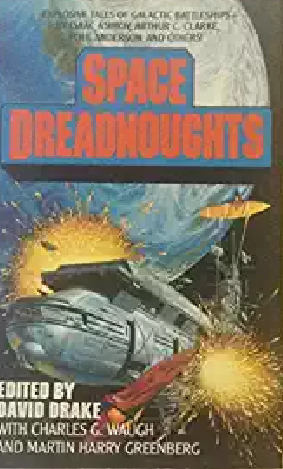
Space Dreadnoughts is a Military Science Fiction anthology by David Drake, Martin H Greenberg and Charles G Waugh. The contents in order of appearance are:
•"Introduction: A quick Look at Battle Fleets" by David Drake
•"The Only Thing We Learn" by Cyril M. Kornbluth
•"C-Chute" by Isaac Asimov
•"Allamagoosa" by Eric Frank Russell (won the Hugo Award for best short story in 1955)
•"A Question of Courage" by J. F. Bone
•"Superiority" by Arthur C. Clarke
•"Hindsight" by Jack Williamson
•"The Last Battalion" by David Drake
•"Shadow on the Stars" by Algis Budrys
•"Time Lag" by Poul Anderson
The first Military Sci Fi story I remember is the Star Trek TOS episode "Balance of Terror," in which Enterprise duels with a Romulan interloper. The military conflict was setting to other conflicts between the crew, the story was full of suspense, and actual battle was a small part of the story. And so it is here.
The book's title is a misnomer. The back cover blurb is misleading-- "Massive and arrogant, they patrol the final war zone-- deep space. All great battleships before them-- . . . are mere toys in comparison." It goes on about "bristling artillery" and "battalions of soldiers." I expected fleet actions involving capital ships. Tactics. Maneuvers. Gunplay. While there are fleet actions and even battleships in some of these stories, they are mere backdrops on a stage where people play out the stories. Truly good Science Fiction involves people, and in all these stories, the people overshadow the military settings that serve only to bring out the characters and whatever lessons there are to be learned from them. All of these stories are well worth reading.
"Introduction: A quick Look at Battle Fleets"
Mr Drake's introduction is a wonderful retrospective about the history of the Dreadnought battleships with a mention of two 1950's Astounding essays on the armaments of spaceships-- one by Willy Ley, the other by Malcolm Jameson. If one is going to write stories about ship-to-ship combat, the introduction is a good starting point. But only a starting point. One should definitely read Mahan, and consider the lessons of Taranto and Pearl Harbor. And the US Navy's Harpoon's and Tomahawk's are wonderful arguments in favor of missles over guns. One should also consider the time honored techniques of ramming and boarding actions.
Perhaps the question of guns vs missles is mooted today. Todays real world warships employ both-- including the Iowa class heavy battleships brought out of retirement and refurbished for President Reagan's naval buildup of the 1980's. The arms race has continued in Sci-Fi beyond what could be imagined with a knowledge of 1950's physics. The Ley and Jameson essays were written before fighters raked Formoria, before rail guns, and CTD imploders, before GRASER's, X-ray LASER's and phaser banks, before the Moties bombarded Mote Prime with asteroids, and before Captain Sheridan laid a gigaton on Z'ha'dum.
"The Only Thing We Learn"
Kornbluth tells a cautionary tale of faded Imperial glory. The barbarians at the gates will one day have descendants that are as decadent and prissy as the effete and ineffectual empire they deposed and replaced. History blurs and magnifies the epic tales of glory. The details are lost. The character is lost. One day a fresh wave of barbarians sweeps aside succcessors that their ancestors would be ashamed to acknowledge. The reader may decide what relationship if any there is between this story and the quote from Friedrich Hegel. A fun story despite the dire consequences for the past and future losers. In his column, "Rereading Kornbluth", Robert Silverberg calls The Only Thing We Learn, "a subtle, oblique, elliptical, sardonic piece of work."
"C-Chute"
Dr. Asimov wrote this story in 1951. It is a psychodrama set aboard a passenger ship taken as a prize by a race of chlorine breathers in Earth's first intersteller war. Each of the passengers is sketched by Asimov to reveal their several flaws of personality, physicality or character. Each has reasons why he should not exit the cabin via the C-chute, EVA, and enter and retake the control room from outside the ship. The reason for the dubious hero to take the heroic action required to retake the ship is one unlikey to appear in the work of any author but Dr. Asimov.
"Allamagoosa"
This story won the 1955 Hugo for best short story. It's a farcical look at officious bureaucracy of the greatest gravity. It's sort of a shaggy dog story, wink, wink. This story in and of itself is worth buying the book for. The build up and so obvious in hindsight ending is fresh enough to be as enjoyable today as it was then.
"A Question of Courage"
Sometimes flair and heedless risk taking can be mistaken for true personal courage. When the genuine article appears, there's no mistaking it. Bone craftliy deveops his characters and sets the reader up for the old maidish Captain "Cautious Charley" Chase of Lachesis to reveal his true nature. It is available from Project Gutenberg.
"Superiority"
Sir Arthur requires no introduction for this story, a reductio ad absurdum about the principle of Illusory Superiority. Technology and bedazzlment with the latest, most theoretically wonderful advances are no substitutes for common sense and sound military doctrine. Perhaps this should serve as a cautionary tale at a time when Iraqi insurgents hack into our drones. According to Wikipedia, this gem was required reading at West Point. The reader easily empathizes with the narrator and his plight, revealed at the end.
"Hindsight"
Jack Williamson has won both the Nebula and the Hugo Awards, and had a career that spanned about seventy years. This story involves temporal mechanics and love, oppression and liberation, and meeting engagements. Incidentally, the guns employed by the Astrach's fleet are of 20-inch caliber and fire four salvos per second. It's a tightly written story, though I think the ending is a little drippy.
"The Last Battalion"
Imagine that Hitler did not die in a bunker in Berlin, but escaped via U-Boat to a secret Waffen-SS base in New Swabia. There German scientists built flying saucers from which they reached the moon to to mine aluminum and build more flying saucers. Now imagine them getting into a war with aliens. With things not looking so good, they kidnap a US Senator to let him know what is going on, intending to drag the US into the conflict. Before they can get where they're going with the Senator, the aliens lay a nuke on their Antartic base. They drop the Senator off to find his own way home. He asks them what they will do. Their colonel replies, we are SS-- we will fight.
"Shadow on the Stars"
Budrys's Farlans are felinoid aliens who at first blush look like humans in cat suits. But they are, on a closer look, "raving paranoid quote." The paranoia is pathological and eventually fatal for Farla-- any military leader with sufficient ability to be effective cannot be trusted by Farla's rulers, and will be killed at the earliest sign of that fatal disease, military competence. The story is a retrospective, the central character telling how he and Farla came to be in their present straits. It is too late for him to convey the warning against trusting Earth, and to late to avoid the inevitable dissolution of Farla.
I have a problem accepting the plot device Budrys uses to set up the narrative, but otherwise the story is interesting and fun to read. The prose is a bit over decourous and affected, but that brings out the effeteness and pretentiousness of the Farlan culture. At the start, the Farlans are hard-pressed by a barabarian culture, the Vilk, and need a strong, capable leader to drive them back. OF course the strong, capable leaders keep their heads down so has not to find themselves assassinated by the Ministry of Preparedness-- and then comes L'Miranid. A previously unknown reservist, he quickly dominates the Fleet and whips them into shape. Victory follows victory until the Vilk host is driven back, their subject planets pounded to rubble, and a Farlan imposed king seated upon their throne.
The real story action is not fleet engatgements and daring raids, though. The story is related by Henlo, one of those capable leaders who has balanced command of a capital ship wtih avoiding notice by the governmental hunters down of competence. He starts the story as having a clear understanding of Farla's problems and the steps necessary to remedy them, but can't afford to be noticed. He becomes L'Mararind's aid, admirer, vice-admiral, intended assasin and successor, and finally, his unwilling co-conspirator and successor. Unwilling to be assasinated himself, he seizes control of the Farlan government. By this time, the sad (for Farla) truth is known to him, but (I love Latin quotes.) "alea jacta est." This is a fine little story with a lovely twist toward the end.
"Time Lag"
Poul Anderson has won both the Hugo and Nebula Awards. Time Lag is a study in contrasts-- evil, greedy invaders against noble, selfless defenders. Chertkoi is a heavily overpopulated industrial planet, drowning in pollution and resource starved. Vaynamo is pristine, with a population sustainable through resource management. Vayanmo is never the less technologically advanced, with the technology's goal as preservation rather than exploitation. Expolitation is the name of Chertkoi's game. It's people conquer other worlds to fuel the industrial fires that smother their world under a cloud of pollution.
The archetype of the Chertoi is the Admiral commanding the invasion fleet. He is matched against the story's view point character, Elva. Elva is the widow of a Vayanmoan noble and prisoner of the Admiral. He is gross, vulgar and uncouth. She is pretty, cultured and well-mannered. He is a love struck boor, hopelessly smitten by her. She subtly endures his presence to manipulate him so that she an return herself and the other captives to Vayanmo in a portrayal that is believable and sympathetic. The invasion is a leveraged takeover in three stages-- a scouting raid, a strategic strike to destroy what little industry the Vayanmo posses, and a full-scale invasion. The title relativistic time lag (fifteen years) gives the Chertkoi time to build their invasion fleet and the Vaynamo time to prepare their reception.
Image cover art under fair use for the review. Contact publisher for reuse.
My text creative commons 4.0
190417
1 note
·
View note